Air Conditioning
Beginner’s Guide to Selecting Ideal Air Conditioning Heat Pumps

Seeking the ideal heat pump air conditioning system? Search no more! In our guide for beginners, we will guide you through all the essential information for choosing the perfect heat pump for your residence.
From understanding cooling and heating efficiency to sizing considerations and exploring different types, we’ve got you covered.
We’ll even dive into energy efficiency ratings, noise levels, and additional features.
Get ready to find the perfect air conditioning heat pump that will keep you cool and comfortable all year round.
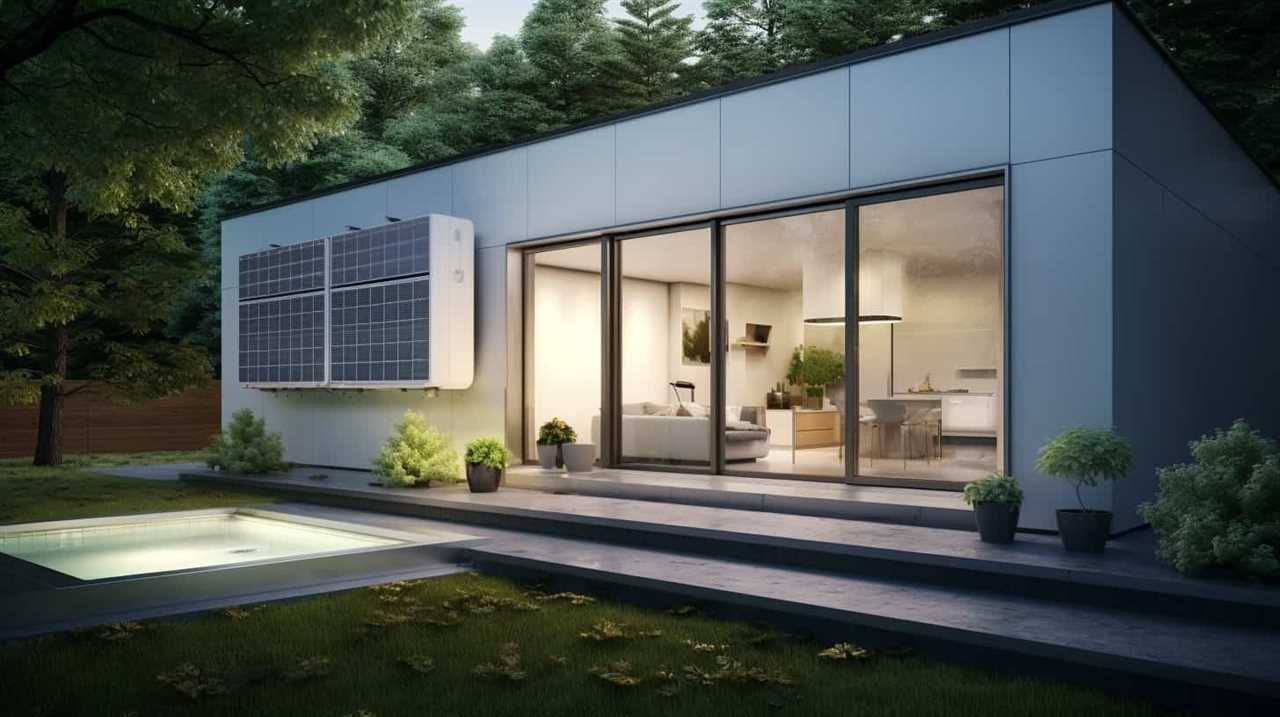
Key Takeaways
- SEER and HSPF ratings are important for evaluating the cooling and heating efficiency of air conditioning heat pumps.
- Maintenance requirements and understanding the defrosting process are crucial for maintaining cooling efficiency in colder climates.
- Coefficient of Performance (COP) is a key factor in determining the heating efficiency of heat pumps.
- Sizing considerations, such as room size, layout, climate, and insulation, are important factors to consider when selecting a heat pump.
Understanding the Basics of Air Conditioning Heat Pumps
As we delve into the topic of understanding the basics of air conditioning heat pumps, it’s important to grasp the concept of how they work. Air conditioning heat pumps are designed to transfer heat from one place to another, providing both cooling and heating capabilities.
To evaluate their energy consumption, it’s crucial to consider their seasonal energy efficiency ratio (SEER) and heating seasonal performance factor (HSPF). SEER indicates the cooling efficiency, while HSPF measures the heating efficiency.
Understanding defrost cycles is also essential as it ensures the heat pump’s performance during colder temperatures. Defrost cycles help remove ice build-up on the outdoor unit’s coils, allowing the heat pump to function optimally.
Evaluating the Cooling Efficiency of Heat Pumps
We can evaluate the cooling efficiency of heat pumps by considering factors such as the seasonal energy efficiency ratio (SEER) and the unit’s ability to effectively remove heat from the indoor space.
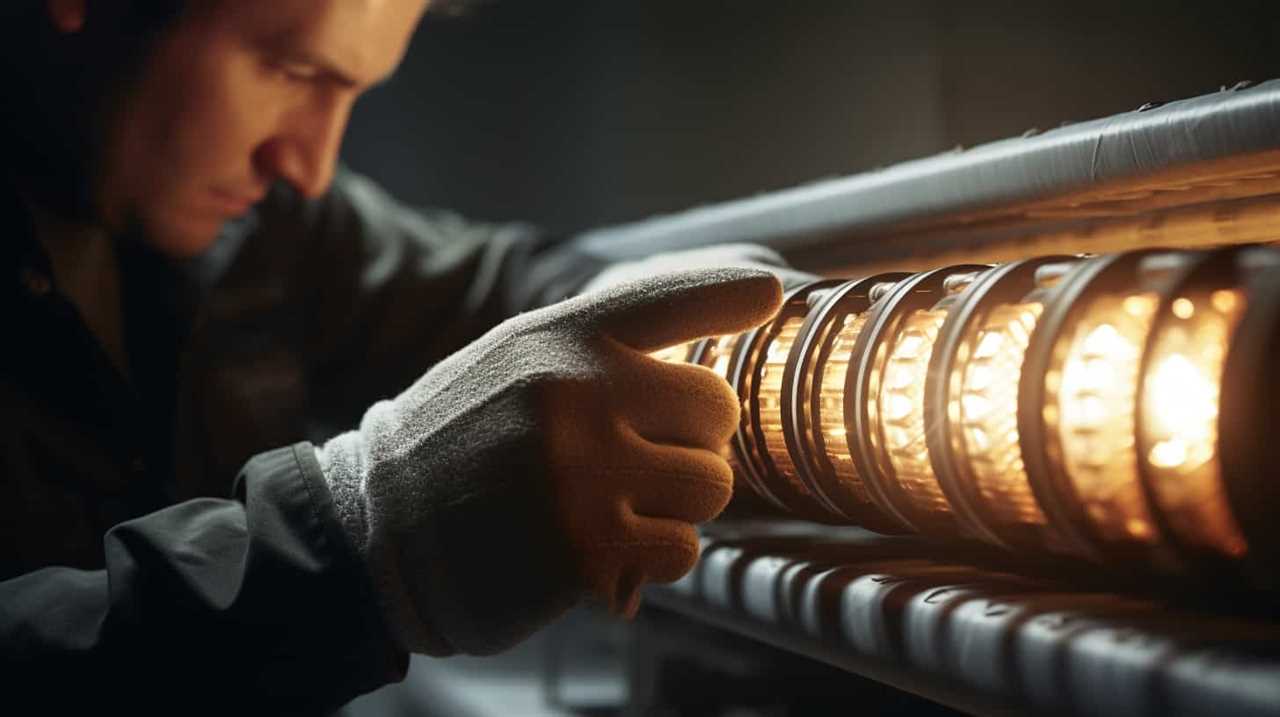
To help you understand the cooling efficiency of heat pumps, here are four important points to consider:
-
SEER: The SEER rating indicates the efficiency of the heat pump in cooling mode. Higher SEER ratings mean better energy efficiency and lower operating costs.
-
Heat Removal Capacity: A heat pump’s ability to effectively remove heat from the indoor space is crucial for efficient cooling. Look for a heat pump with a high heat removal capacity to ensure optimal cooling performance.
-
Evaluating Maintenance Requirements: It’s important to consider the maintenance requirements of a heat pump. Look for models that are easy to clean and maintain, as this can help maximize cooling efficiency and ensure long-term performance.

-
Understanding the Defrosting Process: Heat pumps can experience frost buildup during cold weather, affecting their cooling efficiency. Understanding the defrosting process and choosing a heat pump with an efficient defrosting mechanism is essential for maintaining cooling efficiency in colder climates.
Determining the Heating Efficiency of Air Conditioning Heat Pumps
How can we determine the heating efficiency of air conditioning heat pumps?
When evaluating the heating performance of a heat pump, the key factor to consider is its Coefficient of Performance (COP). The COP is a measure of the ratio between the heat output and the energy input of the heat pump. A higher COP indicates a more efficient heat pump. To calculate the COP, we divide the heat output by the energy consumption. The heat output is measured in British thermal units (BTUs) or kilowatts (kW), while energy consumption is measured in kilowatt-hours (kWh). By comparing the COP values of different heat pumps, we can determine which one will provide the most efficient heating performance.
Understanding the COP is crucial when selecting an air conditioning heat pump to ensure optimal energy efficiency.
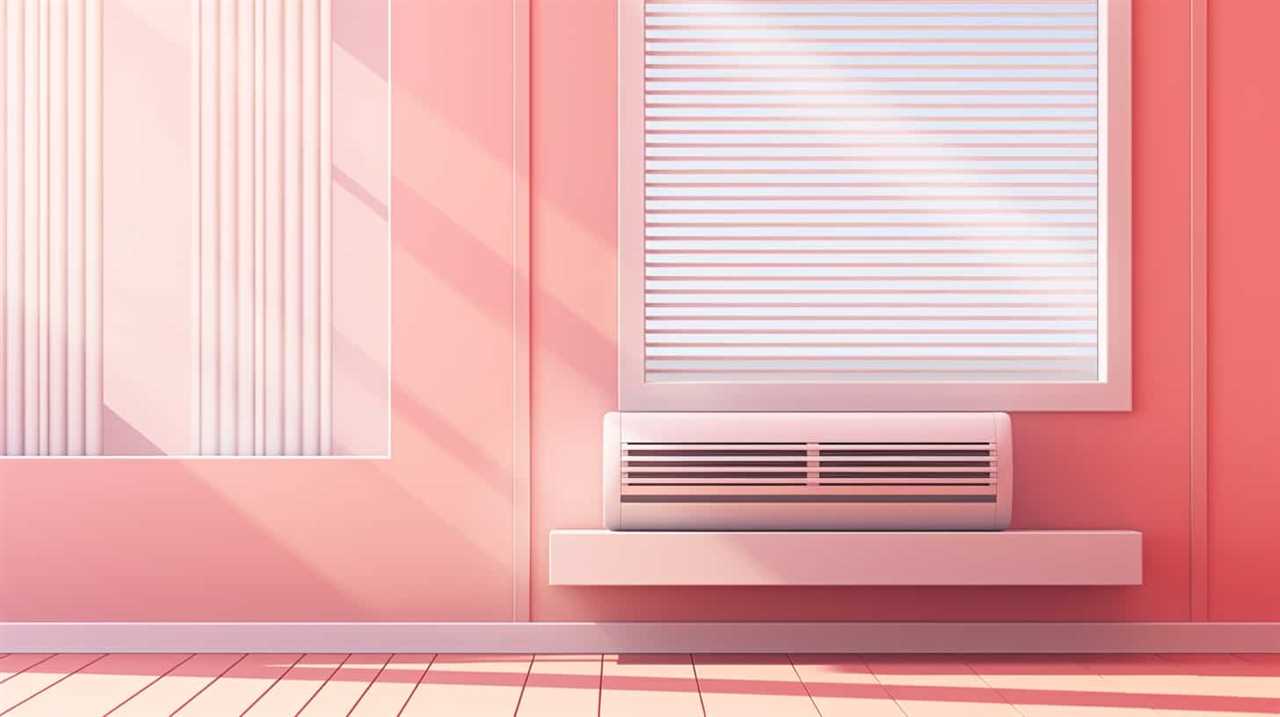
Now, let’s move on to discussing the sizing considerations for heat pumps in air conditioning.
Sizing Considerations for Heat Pumps in Air Conditioning
When determining the sizing considerations for heat pumps in air conditioning, there are several key factors to take into account.
The first is the room size and layout, as larger rooms may require more powerful heat pumps to adequately cool the space.
Additionally, the climate in which the heat pump will be used and the level of insulation in the building are important considerations, as they can impact the efficiency and effectiveness of the heat pump.
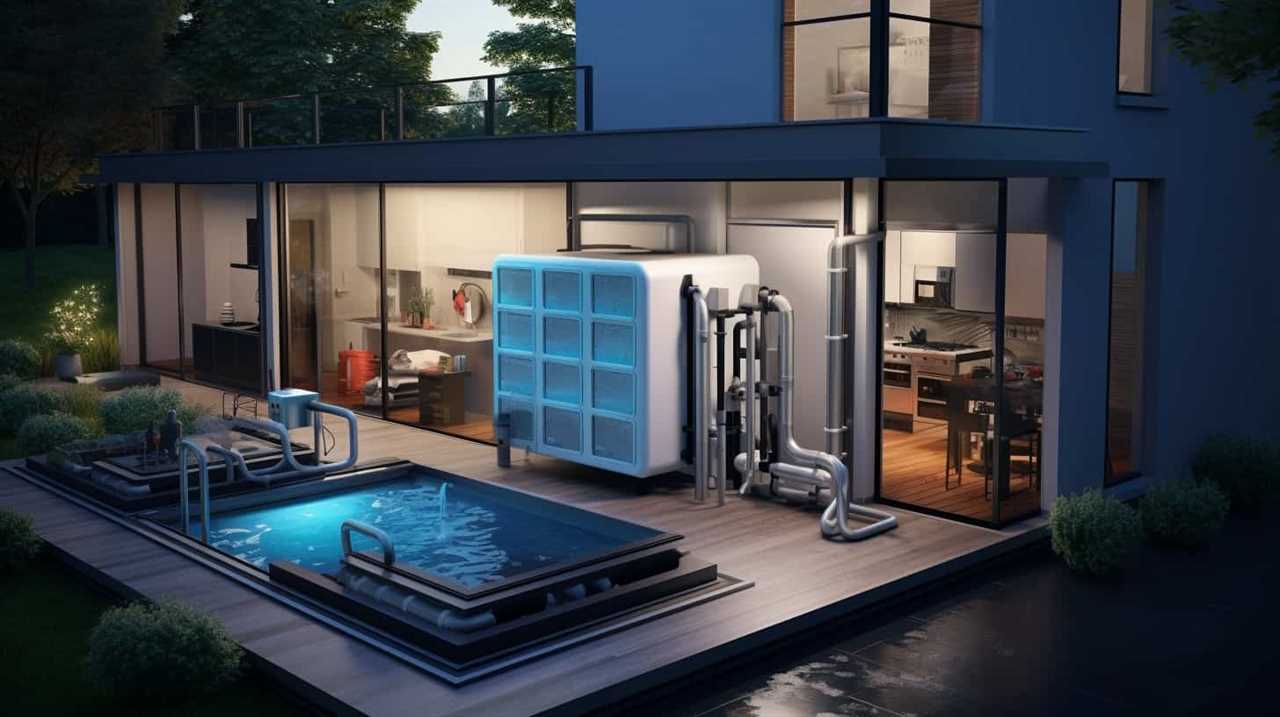
Room Size and Layout
For optimal performance, it’s important to consider the size and layout of the room when selecting an air conditioning heat pump. The room size and layout play a crucial role in determining the effectiveness and efficiency of the heat pump.
Here are some key factors to consider:
-
Room Temperature: The size of the room directly affects the amount of cooling or heating required. A larger room will require a more powerful heat pump to achieve the desired room temperature.
-
Airflow Patterns: The layout of the room influences the airflow patterns. It’s important to choose a heat pump that can effectively distribute air throughout the room, ensuring even cooling or heating.
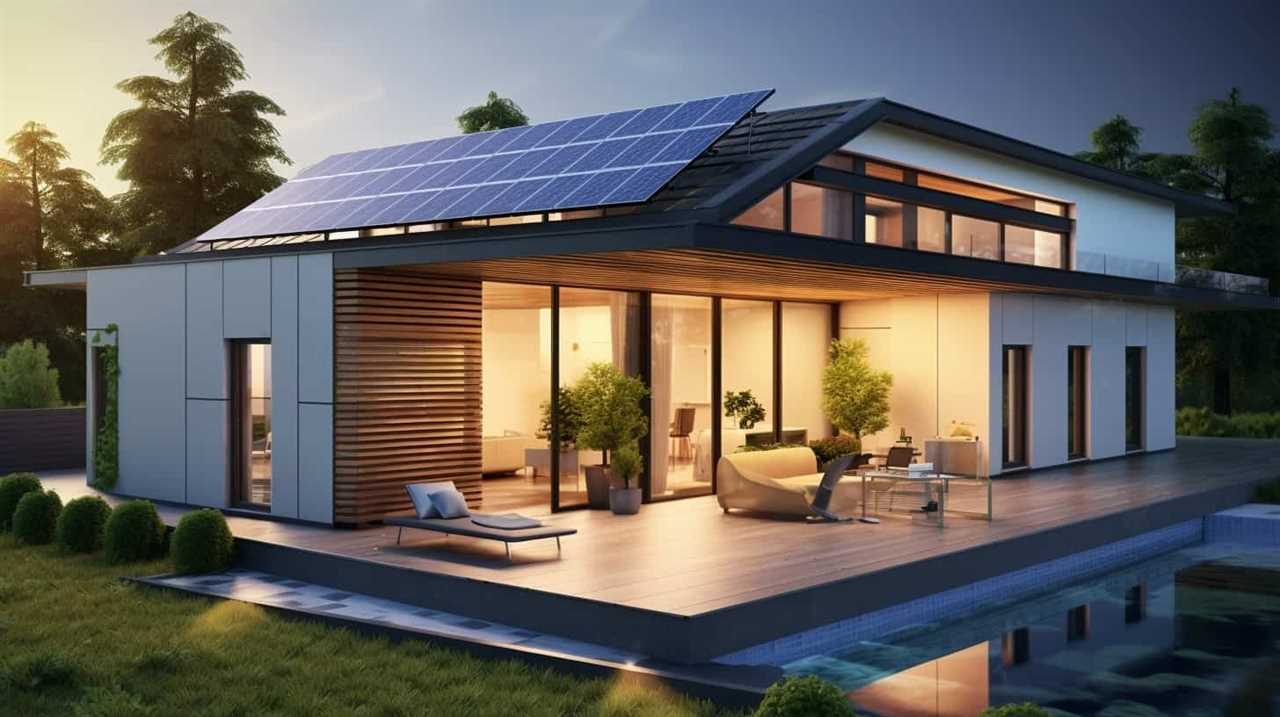
-
Obstacles and Furniture Placement: The presence of obstacles such as walls, furniture, or partitions can affect the airflow and temperature distribution. Consider the placement of the heat pump and ensure that it can overcome any obstacles in the room.
-
Ceiling Height: Rooms with high ceilings may require a heat pump with increased capacity to effectively cool or heat the space.
Climate and Insulation
Considering the climate and insulation of our space is critical in determining the appropriate sizing for heat pumps in air conditioning. The climate affects the heat load of the space, while insulation helps to retain the conditioned air and reduce energy consumption. To ensure optimal performance and energy efficiency, it is important to choose the right size heat pump based on these factors.
When evaluating the climate, consider the average temperature range and humidity levels throughout the year. This information can be obtained from local weather data or HVAC professionals. Insulation materials also play a crucial role in maintaining a comfortable indoor environment. Common insulation materials include fiberglass, cellulose, foam board, and spray foam. Each material has its own thermal conductivity and R-value, which determines how well it resists heat transfer.

To provide a comprehensive overview, here is a table summarizing some energy-saving tips and popular insulation materials:
| Energy-Saving Tips | Insulation Materials |
|---|---|
| Properly seal windows and doors | Fiberglass |
| Use weatherstripping to seal gaps | Cellulose |
| Install attic insulation | Foam board |
| Insulate walls and floors | Spray foam |
By considering the climate and insulation of our space, we can select the appropriate size and type of heat pump to maximize energy efficiency and overall comfort. Now, let’s explore different types of air conditioning heat pumps.
SUBSEQUENT SECTION: ‘Exploring Different Types of Air Conditioning Heat Pumps’
Exploring Different Types of Air Conditioning Heat Pumps
We will now explore the different types of air conditioning heat pumps. When it comes to selecting the ideal heat pump for your needs, it’s important to consider factors such as room temperature and energy consumption. Here are four types of air conditioning heat pumps to consider:
-
Split System: This type of heat pump consists of an indoor and outdoor unit connected by refrigerant lines. It’s energy-efficient and provides both heating and cooling.
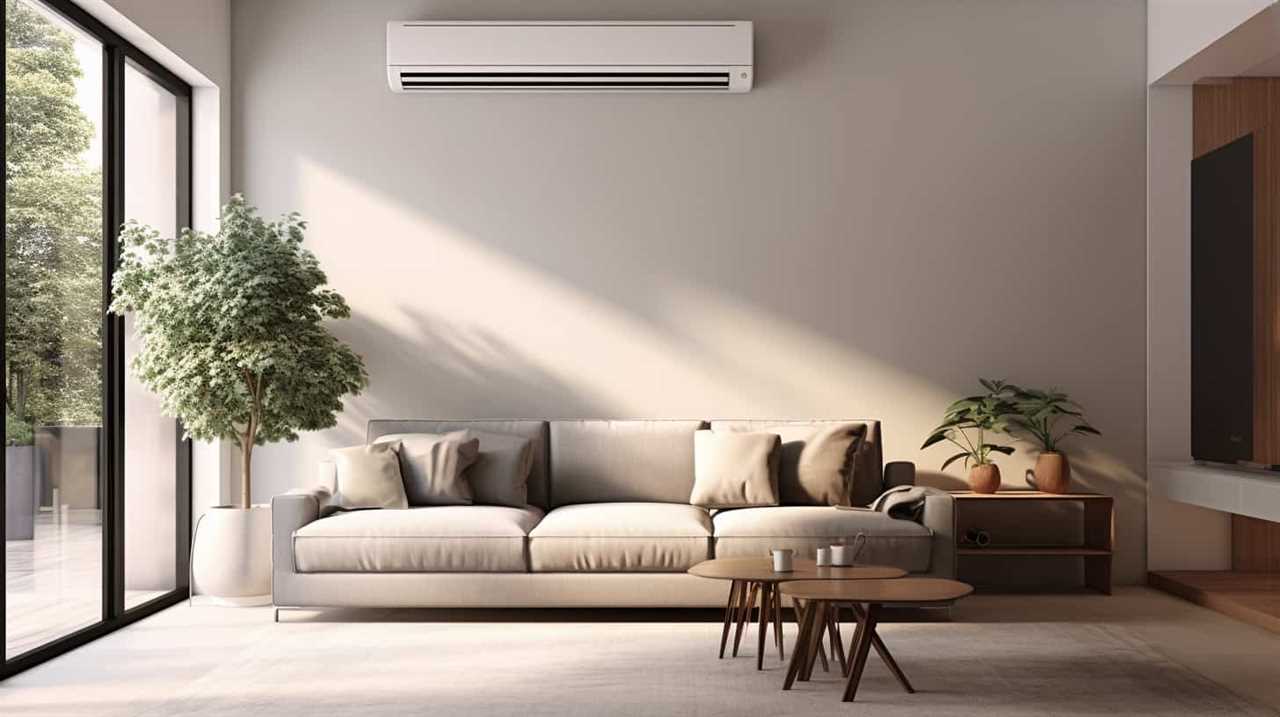
-
Ductless Mini-Split: Ideal for homes without ductwork, this heat pump uses individual units in each room to provide personalized temperature control.
-
Geothermal Heat Pump: This eco-friendly option utilizes the stable temperature of the earth to provide efficient heating and cooling.
-
Packaged Heat Pump: Suitable for limited space, this all-in-one unit is installed outside and provides both heating and cooling.
Comparing Single-Zone and Multi-Zone Heat Pump Systems
Let’s compare the efficiency and functionality of single-zone and multi-zone heat pump systems.

When it comes to the installation process, single-zone heat pump systems are generally easier and less time-consuming to install compared to multi-zone systems. This is because single-zone systems only require the installation of one indoor unit and one outdoor unit, making them more straightforward.
On the other hand, multi-zone heat pump systems require the installation of multiple indoor units, each with its own set of refrigerant lines. This can be more complex and time-consuming, especially if there are many indoor units involved.
In terms of cost comparison, single-zone heat pump systems are typically less expensive than multi-zone systems. This is because the installation process for single-zone systems is simpler and requires fewer components.
Additionally, single-zone systems are often more energy-efficient compared to multi-zone systems, which can lead to long-term cost savings on energy bills.
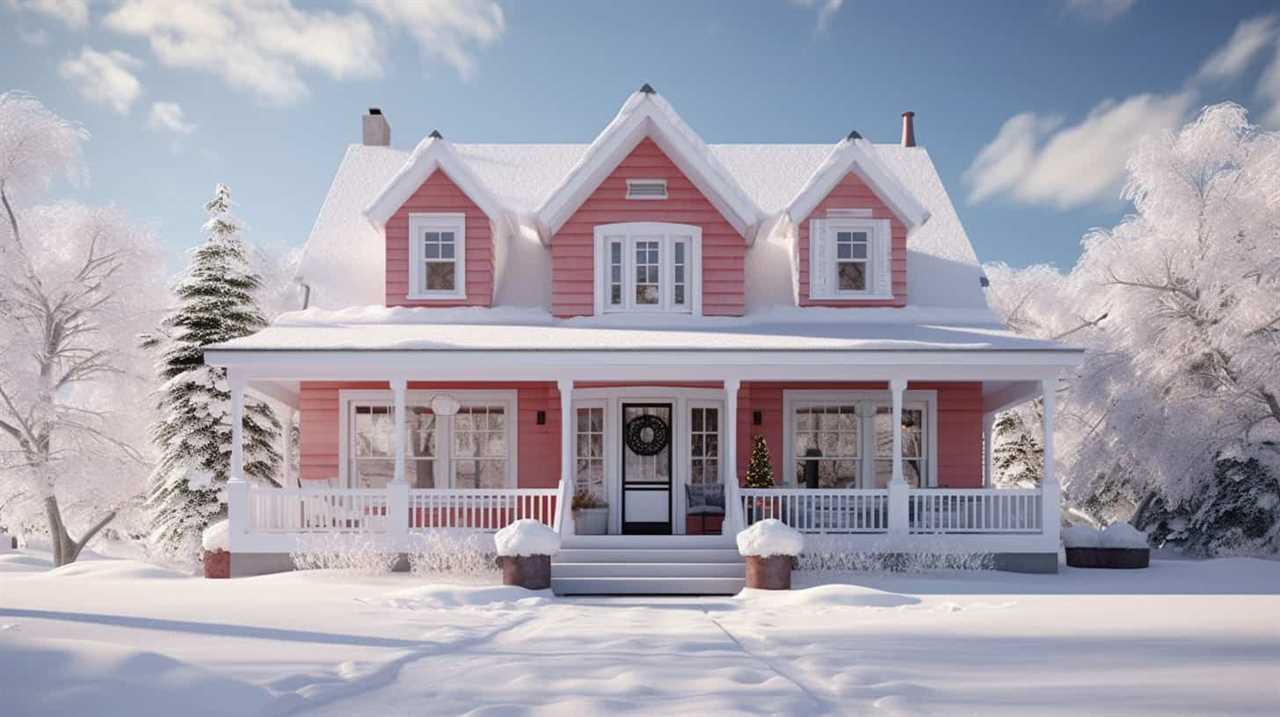
Now that we’ve compared the efficiency, functionality, and cost of single-zone and multi-zone heat pump systems, let’s move on to examining energy efficiency ratings for heat pumps.
Examining Energy Efficiency Ratings for Heat Pumps
To understand the energy efficiency of heat pumps, we need to examine their energy efficiency ratings. These ratings are essential in determining the performance and cost-effectiveness of a heat pump system.
Here are four important factors to consider when examining energy efficiency ratings:
-
SEER (Seasonal Energy Efficiency Ratio) rating: This measures the cooling efficiency of the heat pump during the cooling season. The higher the SEER rating, the more energy-efficient the heat pump is.

-
HSPF (Heating Seasonal Performance Factor) rating: This measures the heating efficiency of the heat pump during the heating season. A higher HSPF rating indicates better energy efficiency.
-
Importance of energy efficiency: Energy-efficient heat pumps consume less energy, resulting in lower utility bills and reduced environmental impact. They also provide better comfort and longer lifespan.
-
Choosing the right rating: Consider your climate, usage patterns, and budget when selecting a heat pump with the most suitable SEER and HSPF ratings for your needs.
Understanding and considering these energy efficiency ratings will help you make an informed decision when selecting the ideal heat pump for your air conditioning needs.
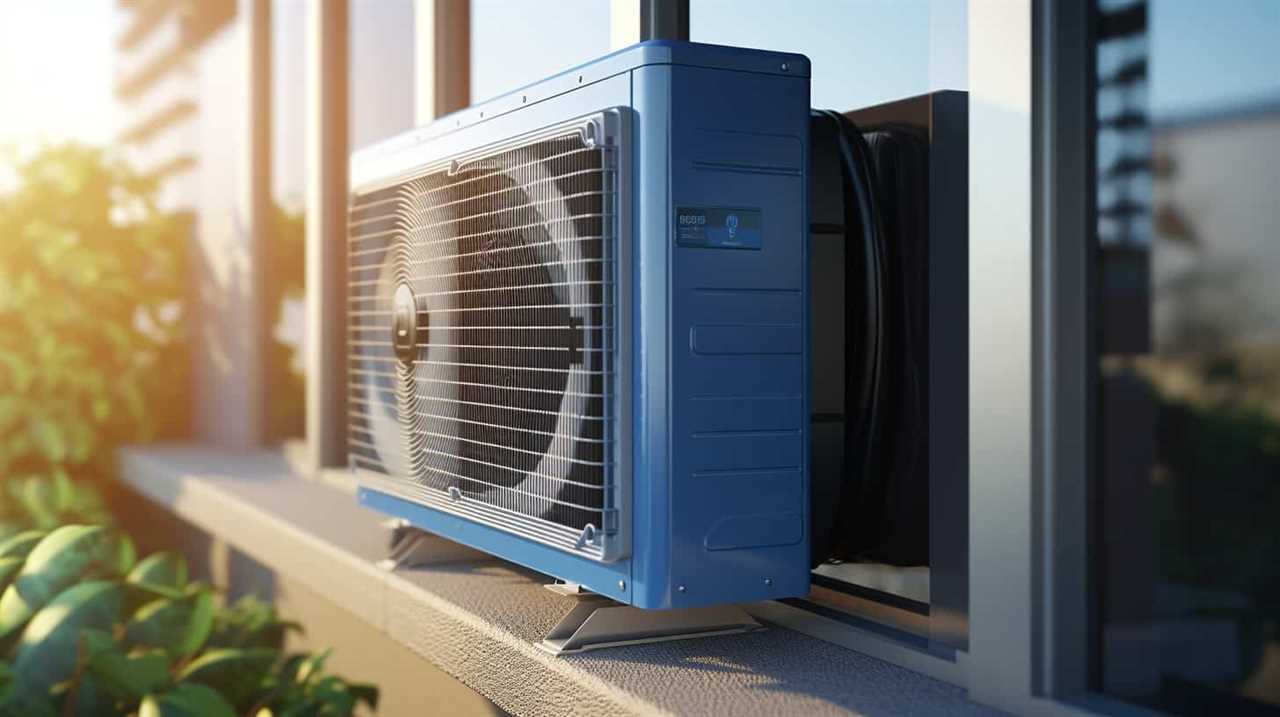
Assessing Noise Levels and Sound Ratings for Heat Pumps
When selecting an air conditioning heat pump, it’s important to consider the noise levels it produces. Sound rating standards, such as the decibel (dB) scale, can help in assessing the noise level of a heat pump.
Opting for a heat pump that operates quietly can provide benefits such as a peaceful environment and reduced disturbance.
Noise Level Importance
We will now discuss the importance of noise levels and sound ratings for heat pumps. When selecting an air conditioning heat pump, it’s crucial to consider the noise it produces. Here are four reasons why noise levels are important:
-
Comfort: A noisy heat pump can disrupt your peace and relaxation, especially in bedrooms or living areas.
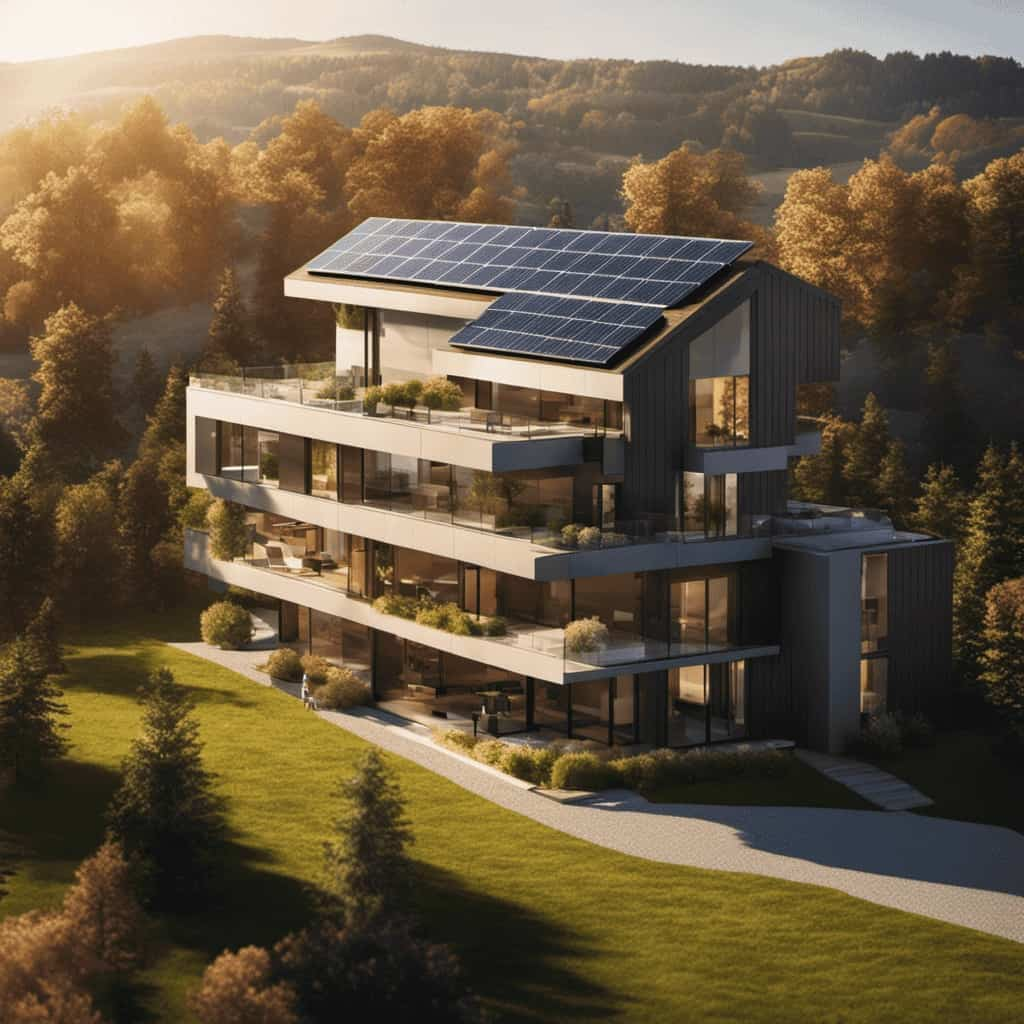
-
Neighborly consideration: Excessive noise can disturb your neighbors, leading to potential conflicts.
-
Soundproofing options: Lower noise levels allow for easier implementation of soundproofing measures, such as acoustic panels or insulation.
-
Maintenance requirements: Noisy heat pumps may indicate underlying issues that require regular maintenance or repairs.
By prioritizing low noise levels and sound ratings, you can ensure a comfortable and peaceful environment while minimizing the risk of neighbor complaints.
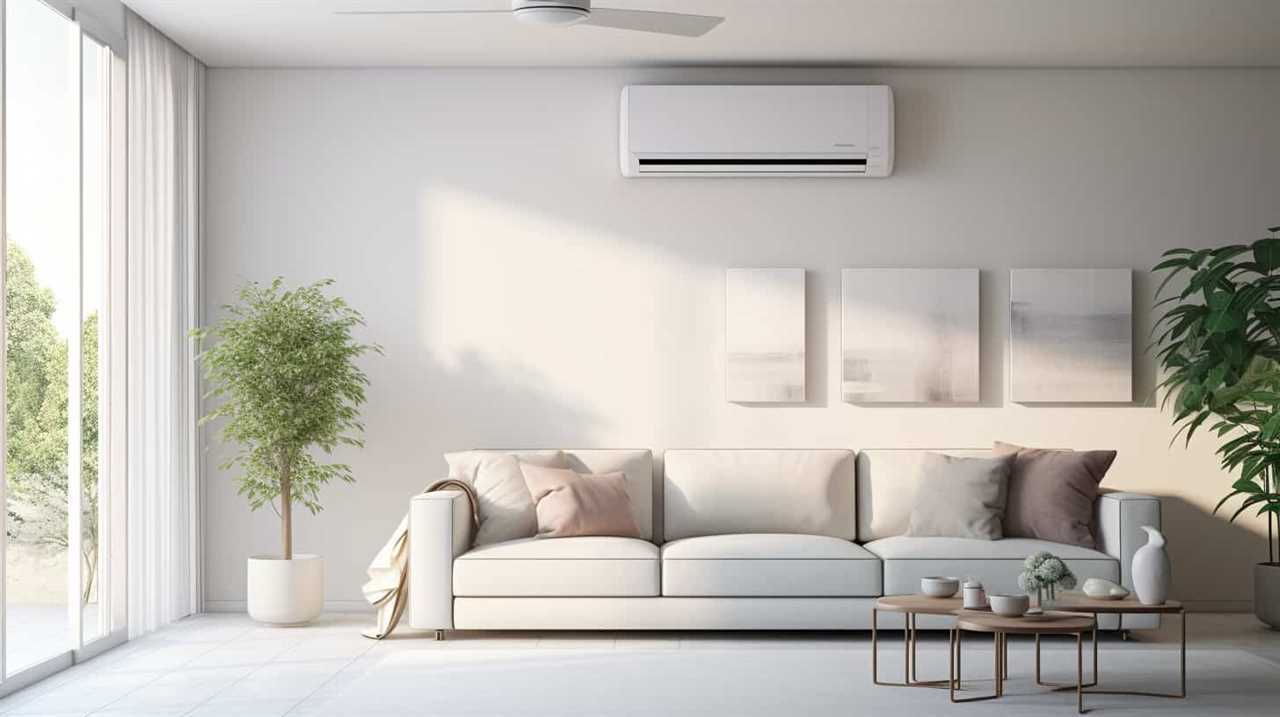
Additionally, quieter heat pumps may also require less maintenance, saving you time and money in the long run.
Sound Rating Standards
Our goal is to understand the sound rating standards and assess the noise levels and sound ratings for heat pumps.
When it comes to sound rating standards, the Air Conditioning, Heating, and Refrigeration Institute (AHRI) has established guidelines to help consumers evaluate the noise levels of heat pumps. The sound rating of a heat pump is measured in decibels (dB), with lower values indicating quieter operation.
To make an informed decision, it’s important to consider the sound rating of a heat pump and compare it to your soundproofing options. Additionally, it’s crucial to understand the maintenance requirements of your chosen heat pump to ensure optimal performance and noise reduction.
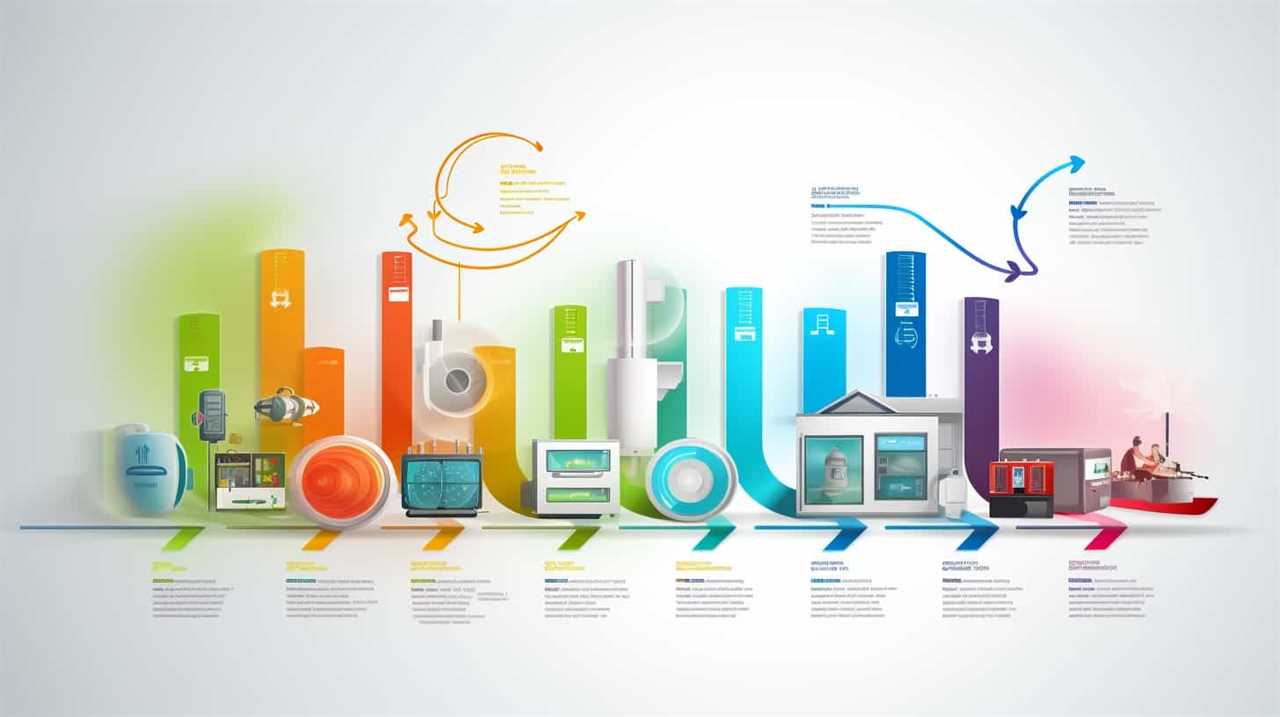
Quiet Operation Benefits
To fully appreciate the advantages of a heat pump’s quiet operation, we must assess the noise levels and sound ratings. When selecting an air conditioning heat pump, it’s important to consider the noise it produces. Here are four key factors to consider:
-
Soundproofing options: Look for heat pumps that come with built-in soundproofing features or that can be easily soundproofed. This will help reduce noise levels and create a more peaceful environment.
-
Maintenance requirements: Regular maintenance can help keep your heat pump running smoothly and quietly. Make sure to clean or replace air filters as recommended and schedule professional maintenance to address any potential noise issues.
-
Sound ratings: Pay attention to the sound ratings provided by manufacturers. Heat pumps with lower sound ratings produce less noise and are ideal for those who prioritize quiet operation.
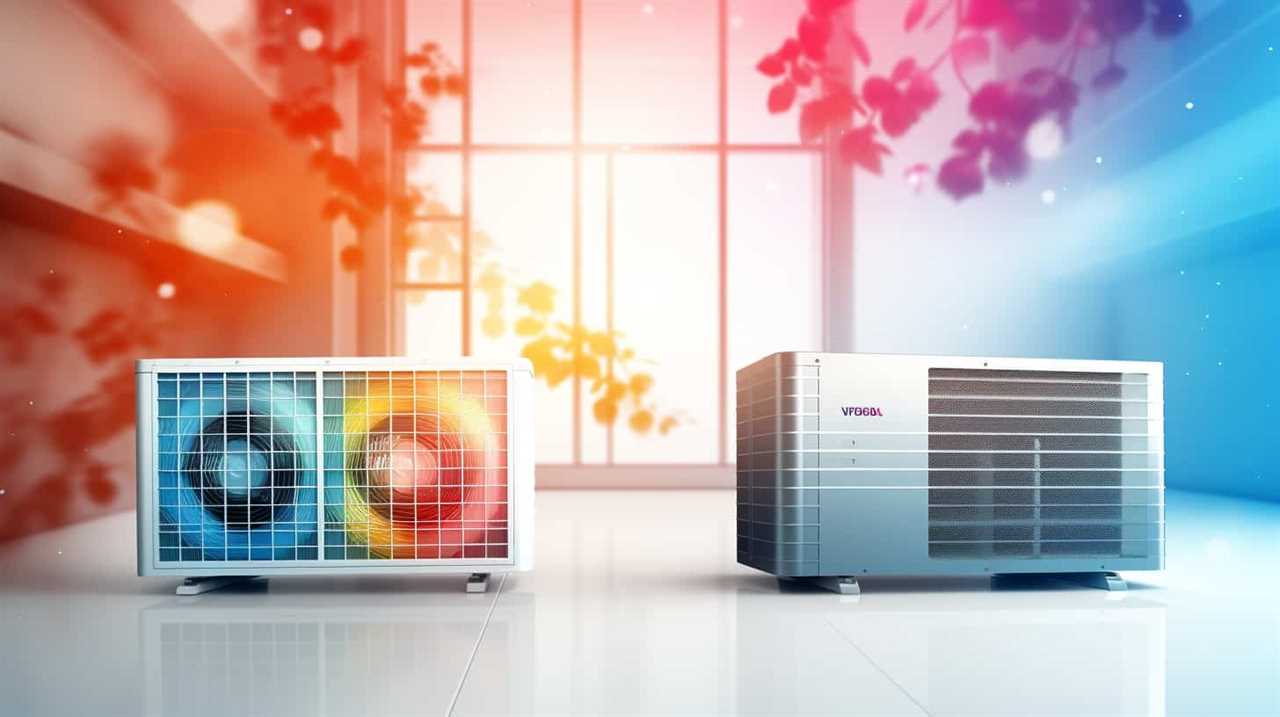
-
Noise reduction features: Some heat pumps are equipped with noise reduction technologies such as advanced compressor insulation or variable speed fans. These features help minimize noise levels and provide a more comfortable living space.
Considering Additional Features and Technology in Heat Pumps
When considering additional features and technology in heat pumps, it’s important to evaluate their energy efficiency and compatibility with your existing HVAC system.
Smart technology has become a popular feature in modern heat pumps, allowing for remote control and monitoring through smartphone apps. This technology enables users to adjust temperature settings, set schedules, and receive energy usage reports, all from the convenience of their mobile device.
Energy saving features are also crucial to consider, as they can help reduce utility bills and minimize environmental impact. Look for heat pumps with features such as programmable thermostats, energy-efficient compressors, and variable-speed fans. These features optimize energy usage by adjusting output based on the specific needs of the space being heated or cooled.
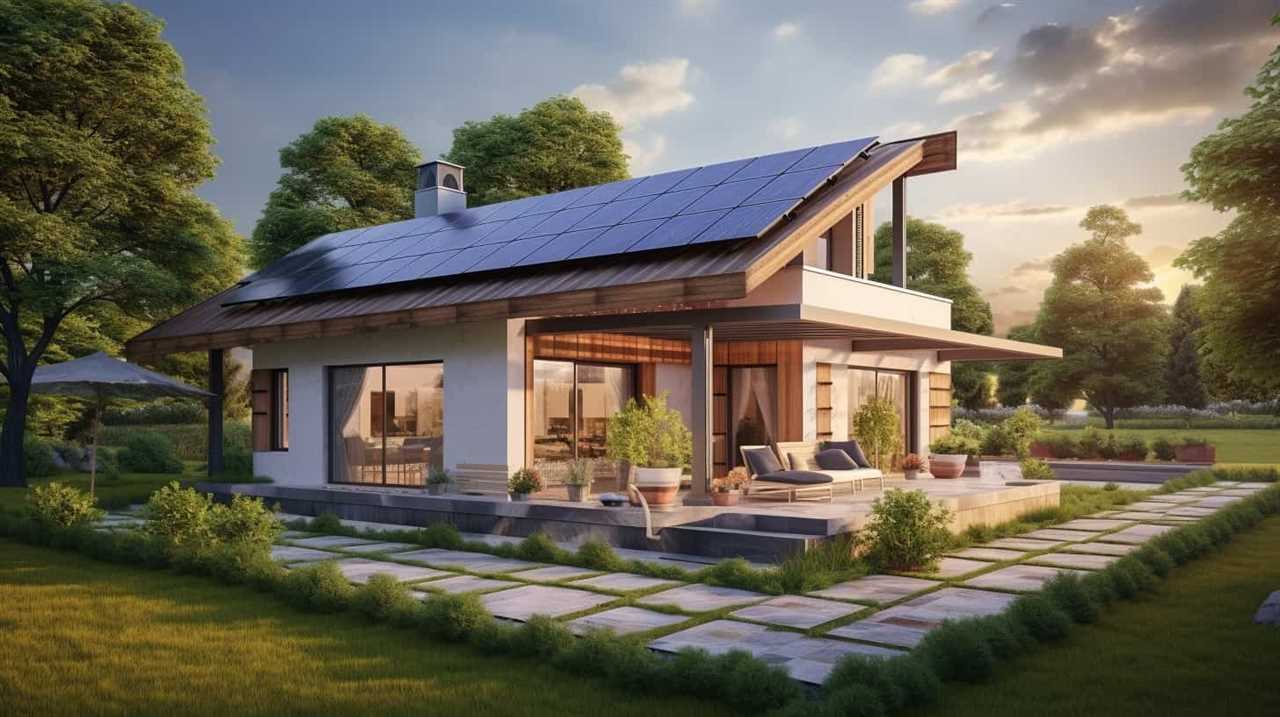
Tips for Finding the Right Air Conditioning Heat Pump for Your Home
When it comes to finding the right air conditioning heat pump for your home, there are a few key points to consider.
First, energy efficiency ratings play a crucial role in determining how well the heat pump will perform and how much energy it will consume.
Second, proper sizing is essential to ensure that the heat pump is capable of effectively cooling or heating your home.
Lastly, professional installation is vital to ensure that the heat pump operates efficiently and safely.
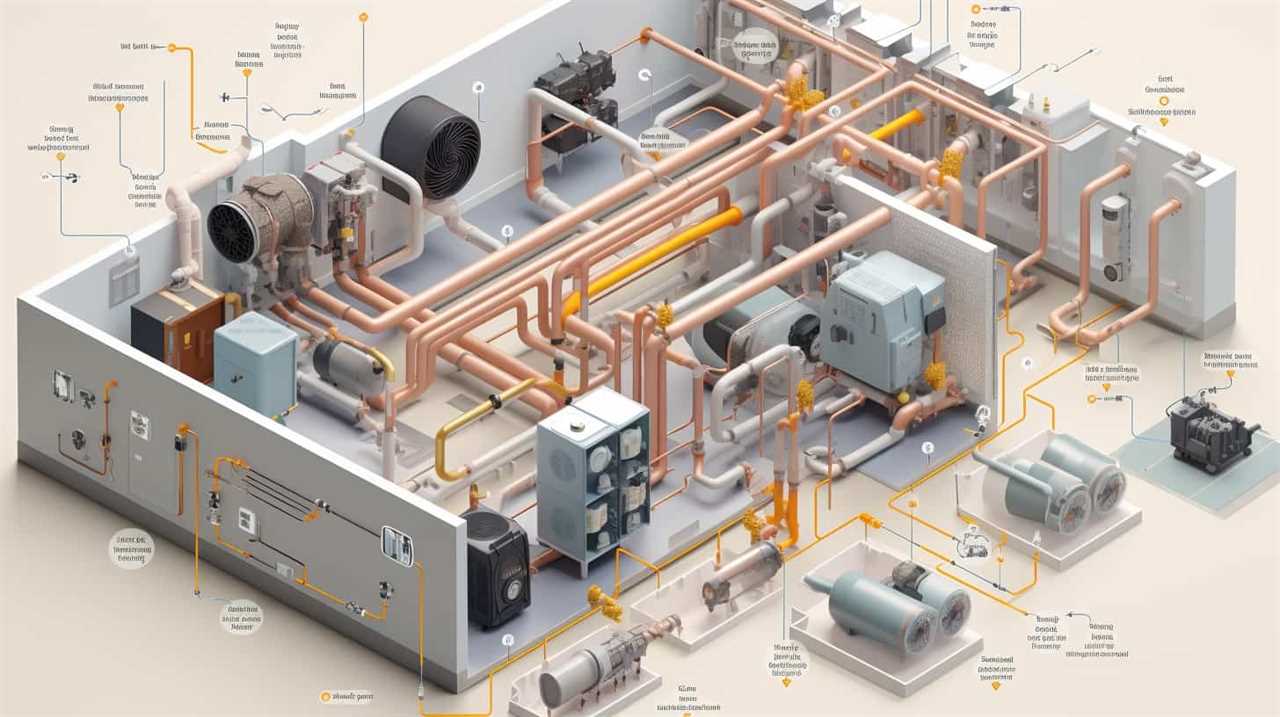
Energy Efficiency Ratings
We recommend considering three key energy efficiency ratings when selecting an ideal air conditioning heat pump for our home. These ratings will help us determine the unit’s energy-saving capabilities and maintenance requirements. Here are the ratings to look out for:
-
Seasonal Energy Efficiency Ratio (SEER): This rating measures the cooling efficiency of the heat pump. Higher SEER ratings indicate better energy efficiency.
-
Heating Seasonal Performance Factor (HSPF): HSPF measures the heating efficiency of the heat pump. Look for a higher HSPF rating to ensure optimal energy savings during colder months.
-
Energy Efficiency Ratio (EER): EER measures the cooling efficiency of the heat pump at a specific outdoor temperature. A higher EER rating signifies better energy efficiency under specific conditions.
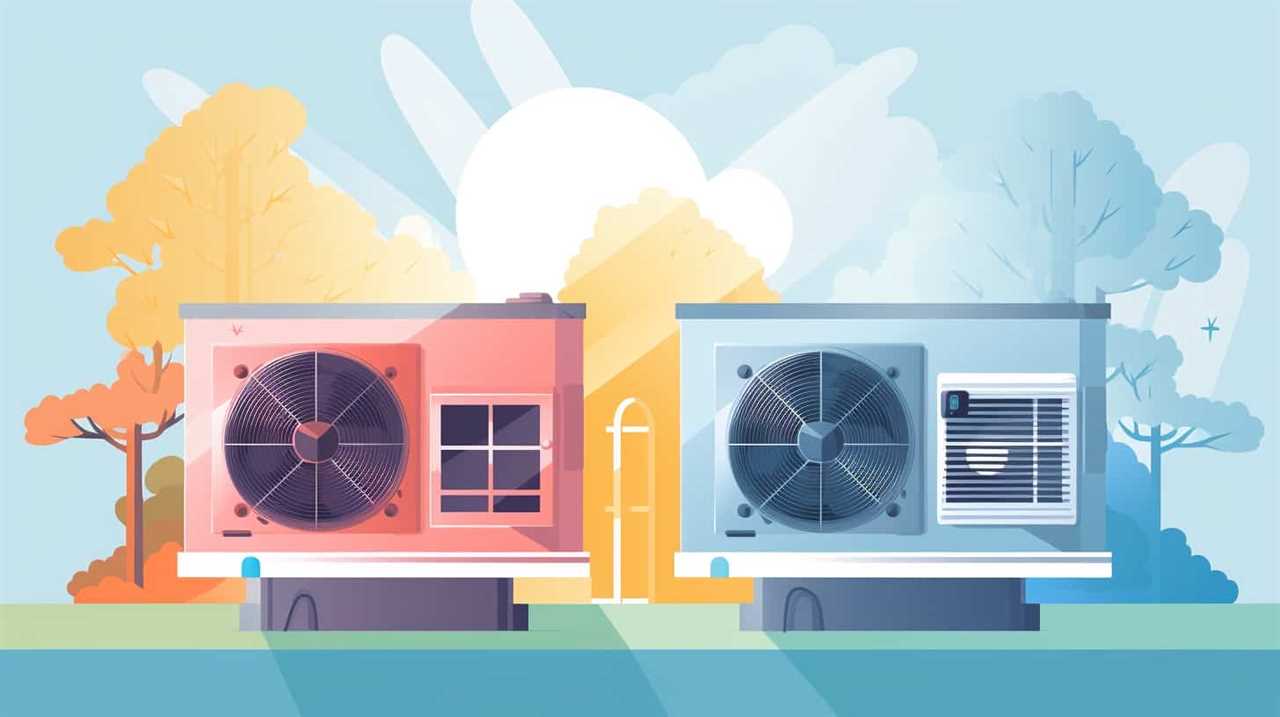
-
Coefficient of Performance (COP): COP measures the ratio of heating or cooling output to the amount of electricity consumed. A higher COP rating indicates better energy efficiency.
Considering these energy efficiency ratings will help us choose a heat pump that maximizes energy savings while minimizing maintenance requirements.
Proper Sizing and Installation
To ensure the proper sizing and installation of our air conditioning heat pump, we need to follow these tips.
First, it’s crucial to accurately determine the size of the heat pump required for your home. This involves considering factors such as the square footage of the space, insulation levels, and climate conditions. A professional HVAC technician can perform a load calculation to determine the appropriate size.
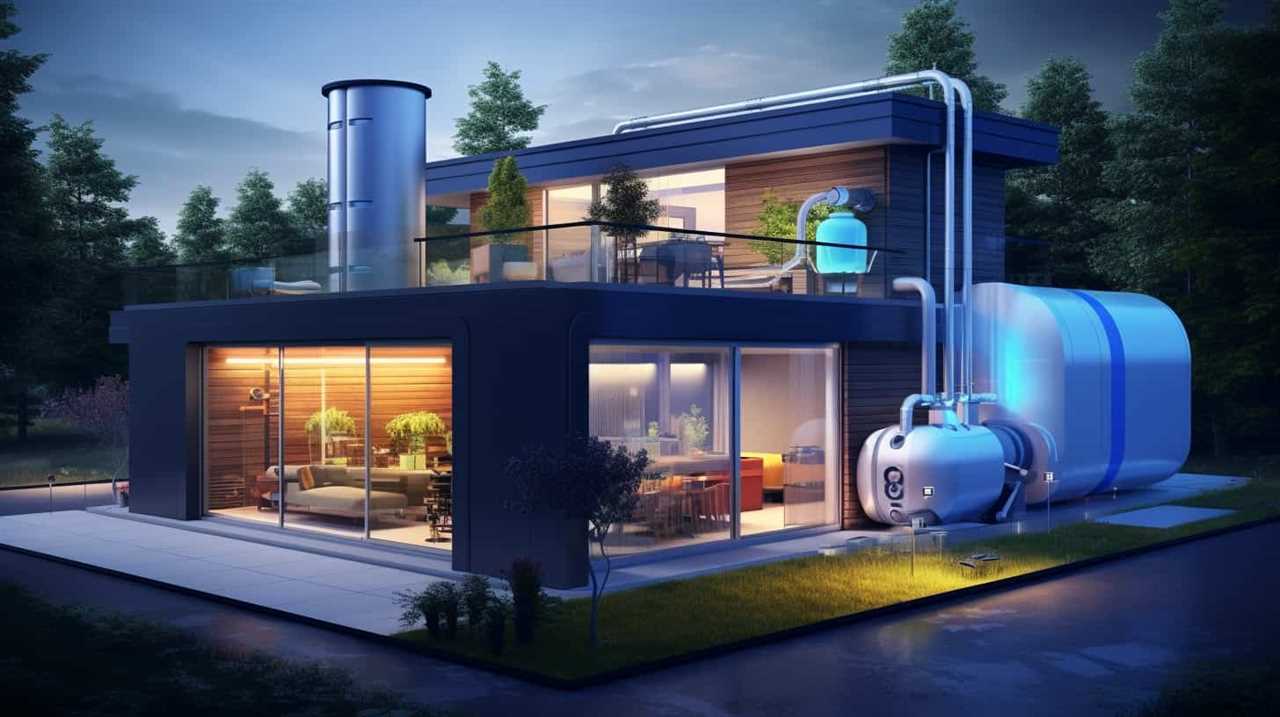
Additionally, proper installation is essential for optimal performance and energy efficiency. It’s recommended to hire a licensed and experienced contractor for the installation process. This will ensure that the heat pump is installed correctly and that all necessary connections, electrical wiring, and refrigerant levels are properly adjusted.
Investing in a well-installed heat pump can save you money in the long run by reducing air conditioning installation costs and ensuring proper heat pump maintenance.
Frequently Asked Questions
What Are the Maintenance Requirements for Air Conditioning Heat Pumps?
We’ll provide air conditioning heat pump maintenance tips and address common issues. Regular filter cleaning, coil inspection, and condensate drain clearing are essential. Checking refrigerant levels, electrical connections, and fan operation is also recommended.
Can Air Conditioning Heat Pumps Be Used in All Types of Climates?
Yes, air conditioning heat pumps can be used in all types of climates. They are efficient compared to traditional air conditioners and can help you choose the right size for your home.
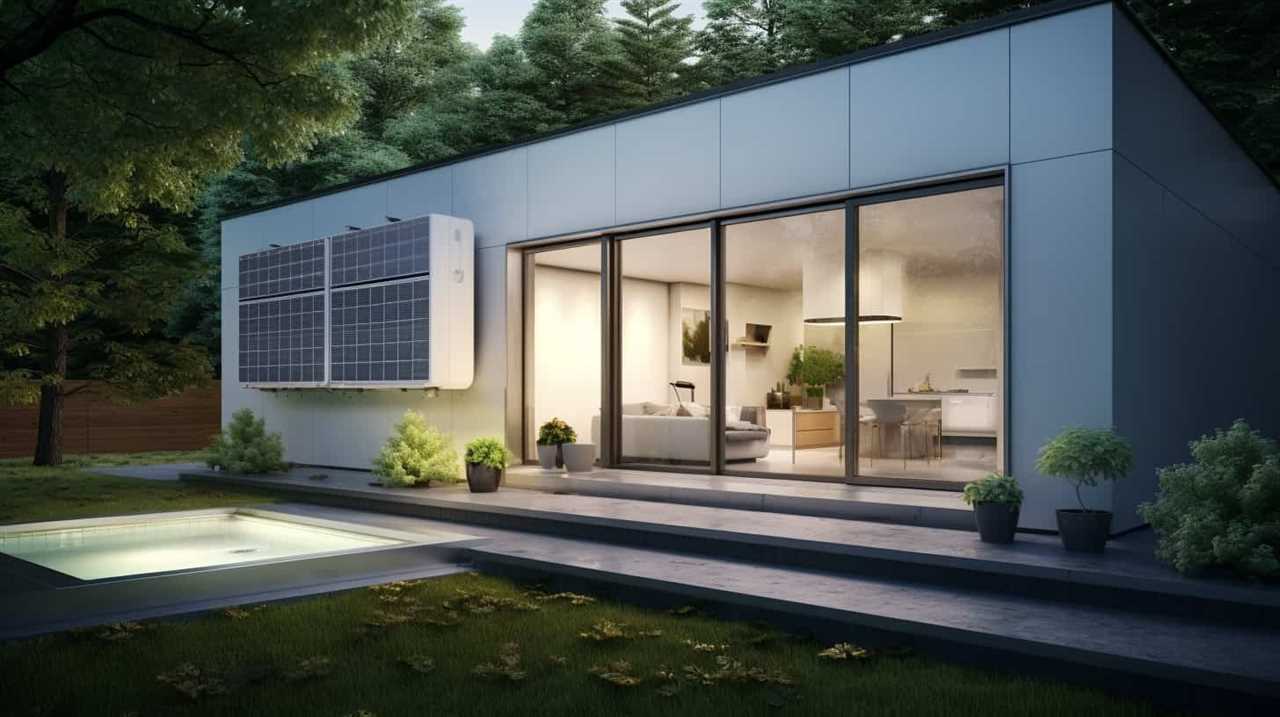
Are There Any Government Rebates or Incentives Available for Purchasing Air Conditioning Heat Pumps?
Yes, there are government rebates and incentives available for purchasing air conditioning heat pumps. These incentives aim to promote energy efficiency and reduce carbon emissions. They vary by region and can help offset the cost of installation and operation.
How Long Is the Typical Lifespan of an Air Conditioning Heat Pump?
The typical lifespan of an air conditioning heat pump can vary depending on factors such as usage, maintenance, and environmental conditions. However, with proper care and regular servicing, these units can last up to 15-20 years.
What Is the Average Cost of Installing an Air Conditioning Heat Pump?
The average cost of installing an air conditioning heat pump depends on various cost factors such as the size of the unit, the complexity of the installation, and the desired energy efficiency.
Conclusion
In conclusion, selecting the ideal air conditioning heat pump requires a careful evaluation of cooling and heating efficiency, sizing considerations, and energy efficiency ratings.
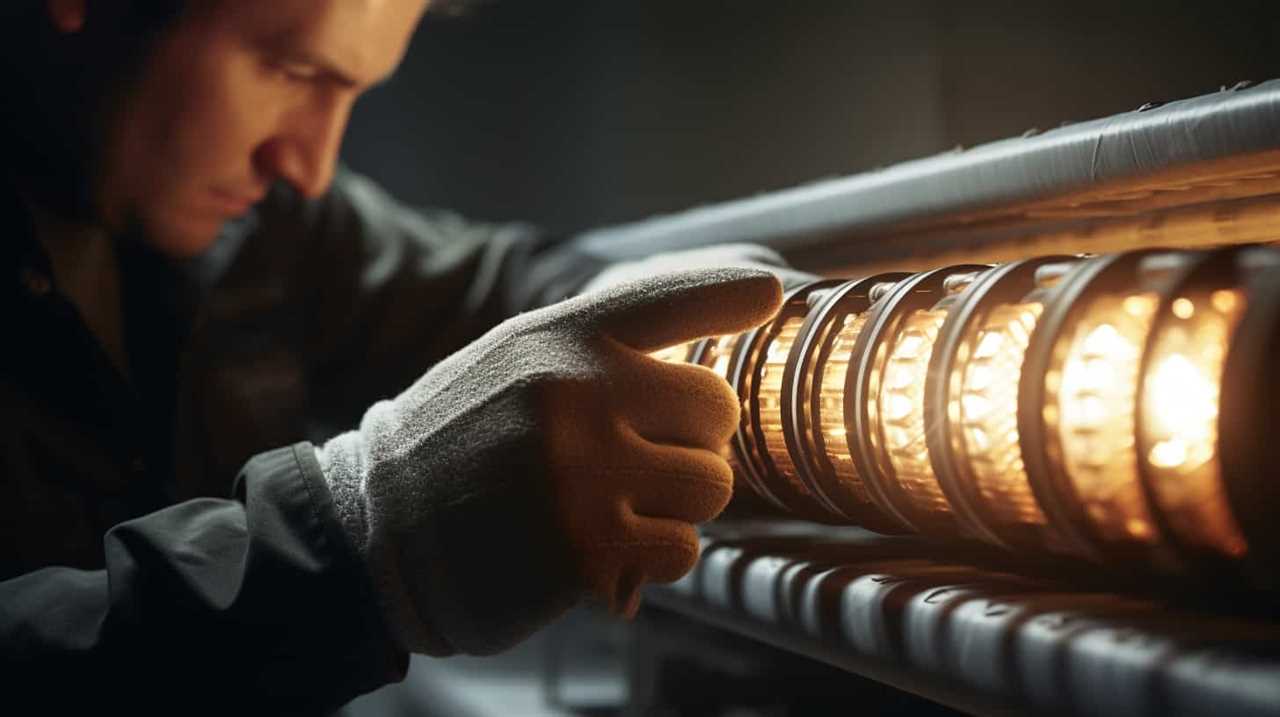
It’s also important to assess noise levels, additional features, and technology.
By considering these factors and exploring different types of heat pumps, homeowners can make an informed decision that will provide optimal comfort and energy savings for their homes.
Remember, finding the right heat pump is essential for a comfortable and efficient cooling and heating system.
Air Conditioning
Renewable Energy: Revolutionizing Heat Pump Performance

We have seen an incredible change in heat pump performance worldwide. The incorporation of renewable energy sources has transformed the efficiency and effectiveness of these systems.
In fact, studies have shown that by incorporating renewable energy, heat pump performance can be enhanced by up to 40%. This statistic alone highlights the immense potential and impact of renewable energy in the realm of heat pumps.
In this article, we will explore the advantages, technologies, and successful applications of this groundbreaking innovation. Get ready to master the future of renewable energy and heat pump performance.
Key Takeaways
- Incorporating renewable energy can enhance heat pump performance by up to 40%.
- Tapping into geothermal energy allows heat pumps to achieve higher efficiencies and reduce reliance on traditional energy sources.
- Integrating renewable energy reduces reliance on fossil fuels and decreases greenhouse gas emissions.
- Variable speed compressors and thermal storage systems are key technologies for enhancing heat pump efficiency with renewable energy.
The Role of Renewable Energy in Heat Pump Performance
In our article, we’ll explore the role of renewable energy in revolutionizing heat pump performance.
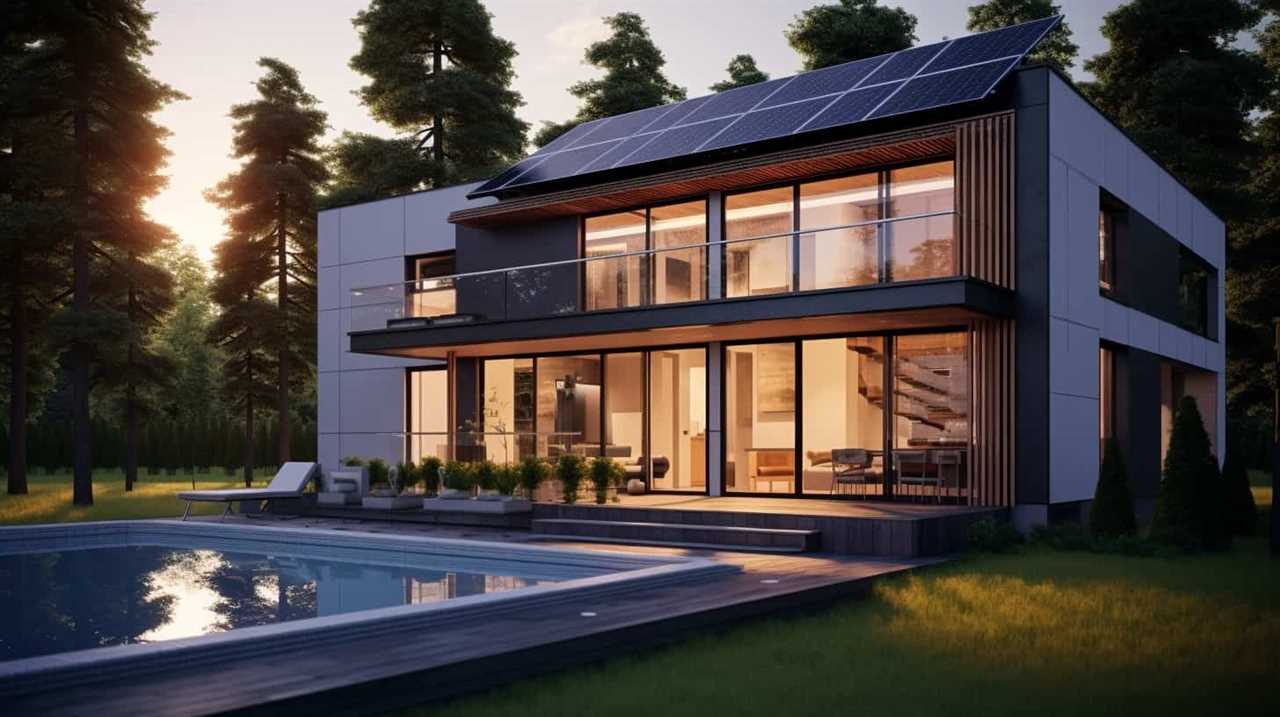
One key aspect is the utilization of geothermal energy, which plays a crucial role in enhancing heat pump performance. Geothermal energy harnesses the heat stored within the Earth, providing a consistent and renewable source of power for heat pumps. By tapping into this energy, heat pumps can achieve higher efficiencies and reduce their reliance on traditional energy sources.
Another significant factor is the impact of solar energy on heat pump efficiency. Solar energy, through the use of photovoltaic panels, can power heat pumps directly, enabling them to operate without drawing electricity from the grid. This integration of solar energy further enhances the overall performance and sustainability of heat pumps.
As we delve into the advantages of integrating renewable energy with heat pumps, these aspects will become even more apparent.
Advantages of Integrating Renewable Energy With Heat Pumps
How can integrating renewable energy with heat pumps benefit us?

The integration of renewable energy with heat pumps offers several advantages, making it a compelling option for optimizing heat pump performance. By harnessing renewable energy sources such as solar or wind power, we can significantly reduce our reliance on fossil fuels and decrease greenhouse gas emissions. This not only contributes to a more sustainable and environmentally friendly energy system but also helps to combat climate change.
Additionally, integrating renewable energy with heat pumps can lead to cost savings by reducing energy consumption and lowering utility bills. Moreover, renewable energy integration allows for better control and flexibility in managing energy supply and demand, leading to improved overall system efficiency.
These benefits highlight the potential of combining renewable energy and heat pumps to create a more efficient and sustainable heating and cooling solution.
In the next section, we’ll explore key technologies for enhancing heat pump efficiency with renewable energy.

Key Technologies for Enhancing Heat Pump Efficiency With Renewable Energy
By utilizing advanced technologies and incorporating renewable energy sources, we can significantly enhance the efficiency of heat pumps. In renewable energy applications, heat pump optimization plays a crucial role in achieving higher performance levels.
One key technology for enhancing heat pump efficiency is the use of variable speed compressors. These compressors allow for precise control of the heat pump’s operation, adjusting the speed and capacity according to the heating or cooling demand. By matching the output to the required load, energy wastage is minimized, resulting in improved efficiency.
Another technology is the integration of thermal storage systems. These systems store excess thermal energy generated by the heat pump during periods of low demand and release it during peak demand, reducing the need for the heat pump to operate at full capacity.
Furthermore, advanced control algorithms and sensors can optimize the heat pump’s operation by continuously monitoring and adjusting parameters such as temperature, pressure, and airflow.

These technologies, when combined with renewable energy sources, can revolutionize heat pump performance, making them a key component in achieving sustainable and efficient heating and cooling systems.
Case Studies: Successful Applications of Renewable Energy in Heat Pump Systems
We frequently encounter successful applications of renewable energy in heat pump systems, showcasing their effectiveness and potential for widespread adoption. These case studies provide real-world examples of how renewable energy can be integrated into heat pump systems to achieve significant energy savings and reduce carbon emissions.
| Case Study | Description |
|---|---|
| Residential Building | A residential building in a cold climate utilized a ground source heat pump system with geothermal energy. This system was able to provide heating and cooling for the entire building while reducing energy consumption by 50%. |
| Industrial Facility | An industrial facility implemented an air-to-water heat pump system with solar thermal panels. This system was able to meet the facility’s heating and hot water demands while reducing energy costs by 40%. |
| Commercial Complex | A commercial complex installed an air-source heat pump system with rooftop solar panels. This system provided heating and cooling for the complex, resulting in a 30% reduction in energy consumption and significant cost savings. |
These successful case studies demonstrate the feasibility and benefits of incorporating renewable energy into heat pump systems, making them a viable solution for achieving sustainable and efficient heating and cooling in various applications.
Future Prospects: Innovations and Trends in Renewable Energy for Heat Pumps
As we look ahead, the future prospects for renewable energy in heat pumps show promising innovations and emerging trends. The advancements in renewable energy for heat pumps are driving the industry towards a more sustainable and efficient future.

Here are four key areas where we see significant developments:
-
Integration of Energy Storage:
With the increasing availability and declining costs of batteries, integrating energy storage systems with heat pumps is becoming more feasible. This allows for better utilization of renewable energy sources and increased flexibility in managing energy demand. -
Smart Grid Integration:
The integration of heat pumps with smart grid technologies enables demand response and grid optimization. By leveraging real-time data and advanced control algorithms, heat pumps can be operated more efficiently and contribute to a more resilient and reliable grid. -
Hybrid Systems:
Combining heat pumps with other renewable energy technologies, such as solar thermal or geothermal, can enhance their performance and overall energy efficiency. These hybrid systems offer the potential for higher energy savings and reduced carbon emissions.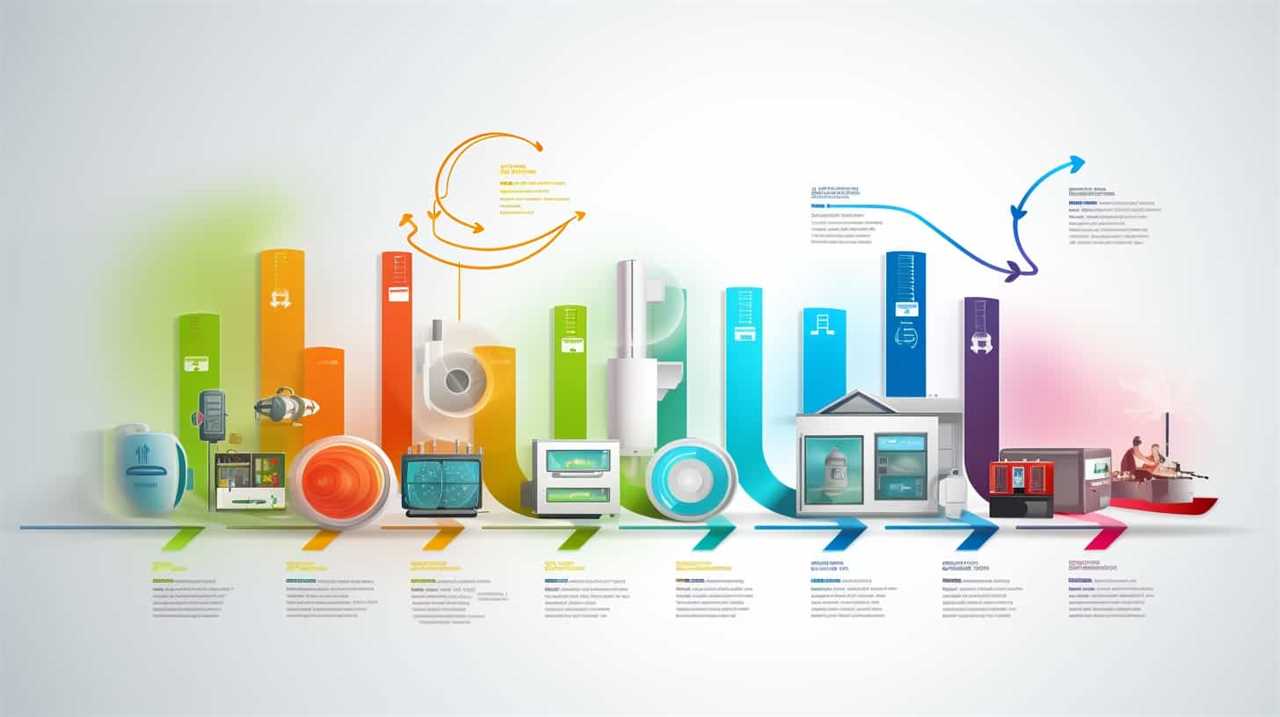
-
Heat Pump Electrification:
As the electricity sector transitions to renewable sources, electrifying heat pumps becomes an attractive option. This trend opens up new market opportunities for renewable energy in the heat pump industry, with the potential to significantly reduce greenhouse gas emissions.
These emerging technologies and market opportunities are paving the way for a greener and more sustainable future for heat pumps. By embracing these innovations and trends, we can revolutionize the performance and impact of renewable energy in the heat pump sector.
Frequently Asked Questions
How Do Heat Pumps Work and What Is Their Role in Renewable Energy Systems?
Heat pump technology utilizes the transfer of heat from one place to another, providing efficient heating and cooling. Its role in renewable energy systems lies in its ability to extract heat from renewable sources, reducing reliance on fossil fuels and lowering carbon emissions.
What Are the Main Advantages of Integrating Renewable Energy Sources With Heat Pumps?
What are the main advantages of integrating renewable energy sources with heat pumps? By combining renewable energy with heat pumps, we maximize energy efficiency, reduce carbon emissions, and contribute to a sustainable future.

What Are Some Key Technologies That Can Enhance the Efficiency of Heat Pumps When Combined With Renewable Energy?
Energy efficient technologies, such as advanced compressors and smart controls, can significantly enhance the efficiency of heat pumps when combined with renewable energy sources. These innovations optimize performance and maximize the utilization of clean, sustainable energy.
Can You Provide Any Real-Life Examples of Successful Applications of Renewable Energy in Heat Pump Systems?
Real-life case studies showcase the benefits and challenges of incorporating renewable energy into heat pump systems. One example is the successful application of geothermal heat pumps in residential buildings, reducing energy consumption and carbon emissions.
What Are the Current and Future Innovations and Trends in Renewable Energy for Heat Pumps?
Innovations in heat pump technology and future trends in renewable energy for heat pumps are shaping the way we maximize efficiency and reduce emissions. We explore the latest advancements and upcoming developments in this field.
Conclusion
In conclusion, the integration of renewable energy with heat pump systems has revolutionized their performance, offering numerous advantages and enhancing efficiency. This combination of technologies has proven successful in various case studies, showcasing its potential for widespread implementation.
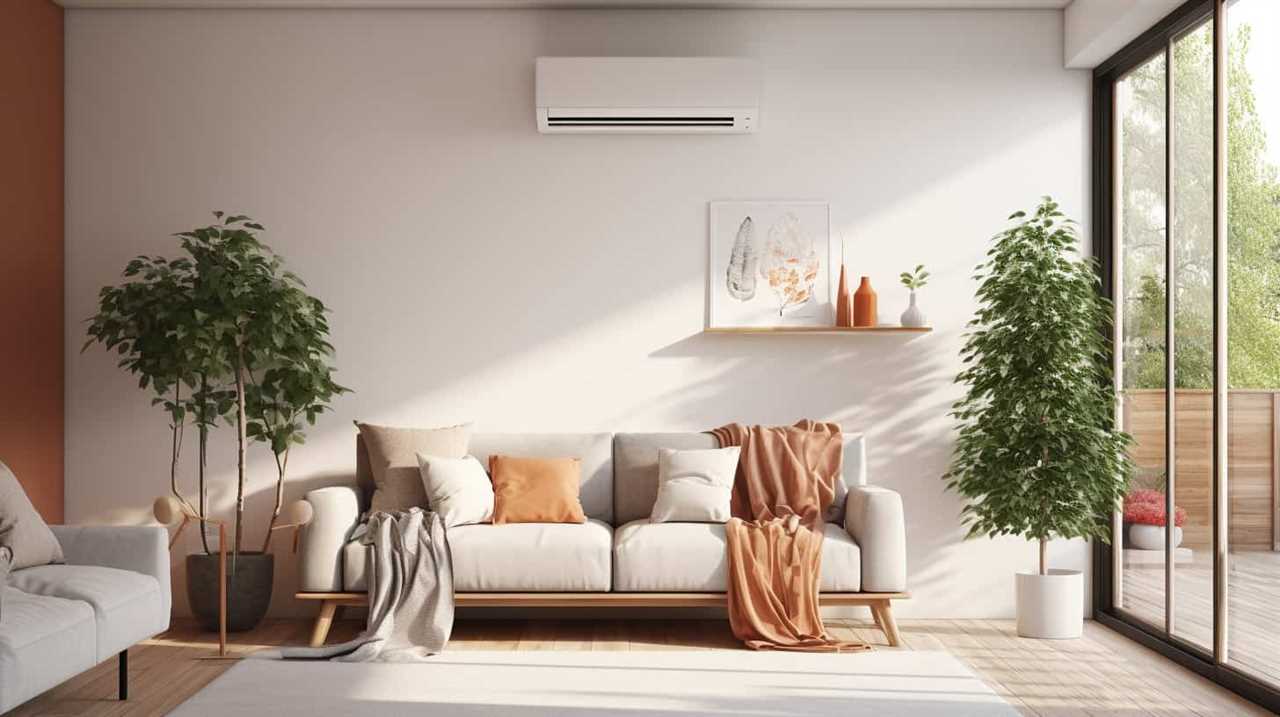
As innovations continue to emerge, the future prospects for renewable energy in heat pumps are promising. By harnessing the power of renewable sources, we can achieve sustainable and cost-effective heating solutions, paving the way for a greener and more efficient future.
Remember, ‘Innovation is the key to unlocking a sustainable future.’
Air Conditioning
Understanding Energy-Efficient Heat Pumps for Green Homes

We have all the information on energy-efficient heat pumps for environmentally friendly homes. These sustainable systems are top-notch when it comes to heating and cooling while also benefiting the planet.
In this article, we’ll break down how these pumps work, what to consider when choosing one, and the different types available. Plus, we’ll share tips on maximizing energy savings through proper maintenance.
Get ready to dive into the world of eco-friendly heating and cooling!
Key Takeaways
- Energy-efficient insulation materials and renewable energy sources are important for creating eco-friendly and cost-effective green homes.
- Heat pumps utilize heat transfer to provide sustainable heating and cooling while minimizing environmental impact.
- When choosing an energy-efficient heat pump, consider factors such as SEER and HSPF ratings, variable speed compressors, dual fuel capability, and environmentally friendly refrigerants.
- Different types of heat pumps, such as air source, ground source, and water source, have different applications based on climate, available space, and budget.
The Importance of Energy Efficiency in Green Homes
We believe that maximizing energy efficiency should be a top priority in our green homes. One way to achieve this is through energy-efficient insulation. By using insulation materials that have a high R-value, such as cellulose or spray foam, we can reduce heat loss and minimize the need for heating or cooling. This not only helps to lower energy consumption but also creates a comfortable living environment.

Additionally, incorporating renewable energy sources in energy-efficient homes can further enhance their sustainability. Solar panels, for example, can harness the power of the sun to generate electricity, reducing our reliance on fossil fuels. By prioritizing energy efficiency and utilizing renewable energy sources, we can create homes that are both eco-friendly and cost-effective.
Transitioning to the next section, let’s now explore how heat pumps work for sustainable heating and cooling.
How Heat Pumps Work for Sustainable Heating and Cooling
To understand how heat pumps work for sustainable heating and cooling, it’s important to grasp the process of heat transfer and the role of refrigerant in this system.
Heat pump technology utilizes the principle of heat transfer to extract heat from the environment and transfer it into a building for heating or remove heat from the building for cooling. This process is achieved by circulating a refrigerant, which absorbs heat when it evaporates and releases heat when it condenses. The refrigerant acts as the medium that facilitates the transfer of heat.

By utilizing this process, heat pumps can provide efficient heating and cooling while minimizing their environmental impact.
Now that we understand the basics of how heat pumps work, let’s explore the key factors to consider when choosing an energy-efficient heat pump.
Key Factors to Consider When Choosing an Energy-Efficient Heat Pump
Considering the efficiency, cost, and environmental impact are key factors when choosing an energy-efficient heat pump. To ensure you make the right decision, here are some important criteria and energy-saving features to consider:
-
Seasonal Energy Efficiency Ratio (SEER): Look for a heat pump with a high SEER rating, as it indicates better energy efficiency.

-
Heating Seasonal Performance Factor (HSPF): Higher HSPF ratings translate to more efficient heating performance.
-
Variable Speed Compressor: This feature allows the heat pump to adjust its speed according to the heating or cooling needs, resulting in better energy savings.
-
Dual Fuel Capability: Opt for a heat pump that can switch between electric and gas heating, allowing you to choose the most cost-effective option.
-
Refrigerant Type: Consider heat pumps that use environmentally friendly refrigerants with low global warming potential.
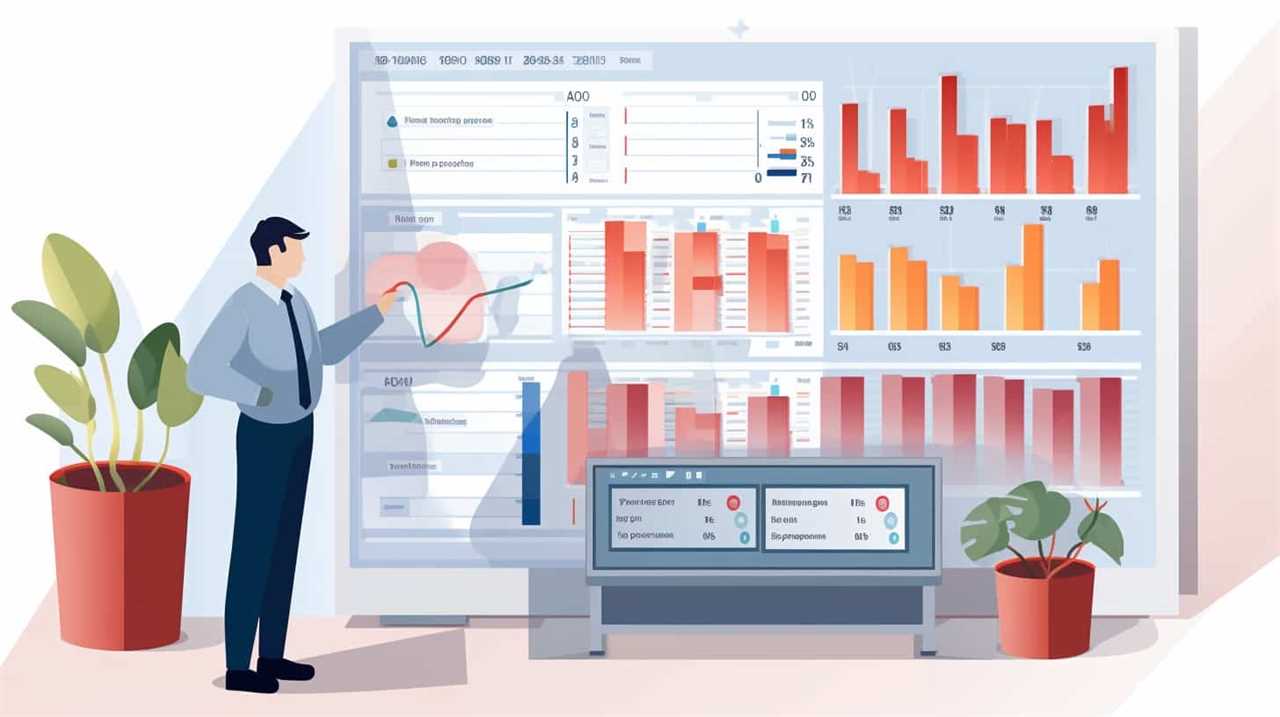
Understanding the Different Types of Heat Pumps for Green Homes
As we delve into the topic of understanding the different types of heat pumps for green homes, it is important to note that there are several options available to homeowners. Heat pumps are a popular choice for heating and cooling homes efficiently while minimizing environmental impact. Let’s take a closer look at the different types of heat pumps commonly used in green homes:
| Type | Description | Benefits |
|---|---|---|
| Air Source | Transfers heat between the indoor air and outdoor air | Cost-effective, easy installation, suitable for moderate climates |
| Ground Source | Utilizes the stable temperature of the ground to heat and cool homes | Highly efficient, long lifespan, consistent performance |
| Water Source | Extracts heat from water bodies, such as lakes or wells | High efficiency, versatile applications, reliable performance |
Choosing the right type of heat pump for your green home depends on factors such as climate, available space, and budget. Additionally, it’s worth exploring heat pump installation rebates and incentives offered by local and federal governments to make your investment more affordable.
Maximizing Energy Savings With Proper Heat Pump Maintenance
By regularly performing proper heat pump maintenance, we can maximize energy savings in our green homes. Maintaining our heat pumps not only ensures their efficiency but also reduces our carbon footprint. Here are some heat pump maintenance tips and energy-saving practices to help us achieve optimal performance and energy efficiency:
- Clean or replace air filters regularly to improve airflow and reduce energy consumption.
- Keep the outdoor unit free from debris, such as leaves and branches, to maintain proper airflow.
- Schedule professional maintenance annually to check for refrigerant leaks, clean coils, and optimize system performance.
- Insulate the air ducts to minimize heat loss during the distribution process.
- Use a programmable thermostat to set temperature schedules and avoid unnecessary energy consumption.
Frequently Asked Questions
Can Heat Pumps Be Used to Heat Water in Addition to Providing Heating and Cooling for the Home?
Yes, heat pumps can be used for heating water as well as providing heating and cooling for the home. Using heat pumps for swimming pools and water heating offers numerous benefits, such as energy efficiency and reduced greenhouse gas emissions.
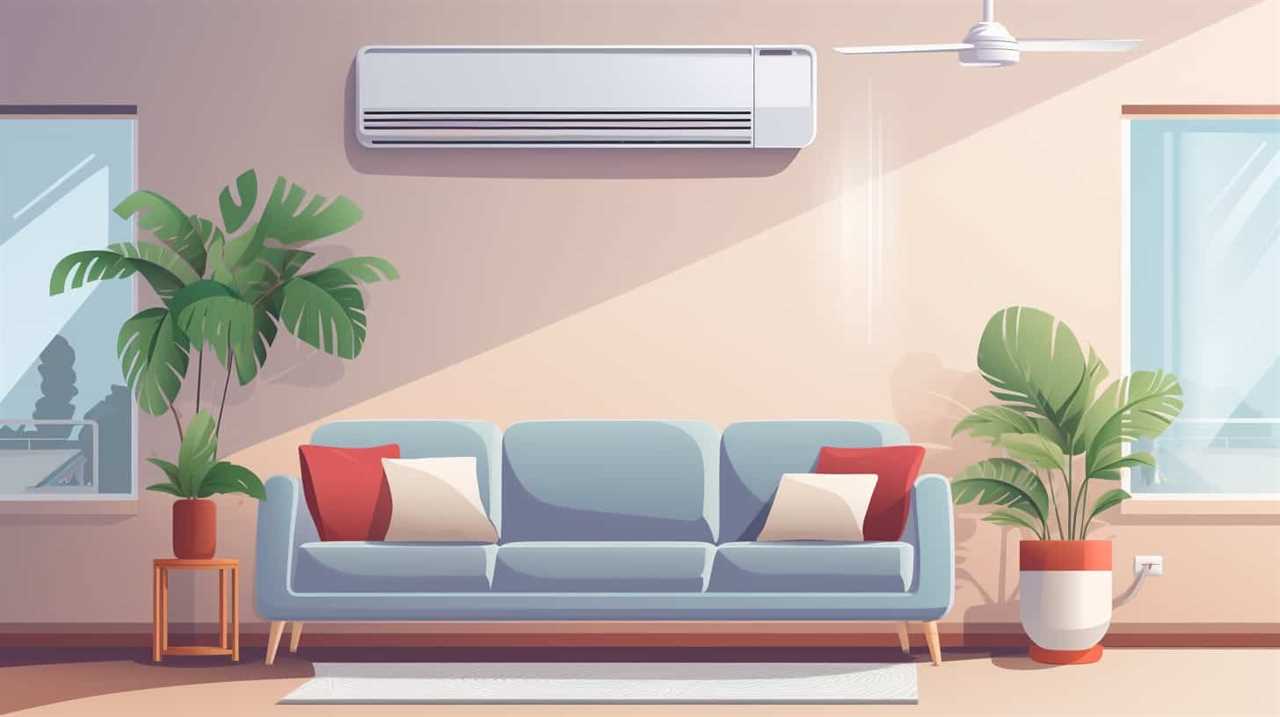
Are There Any Government Incentives or Rebates Available for Installing Energy-Efficient Heat Pumps in Green Homes?
Yes, there are government incentives, rebates, and tax credits available for installing energy-efficient heat pumps in green homes. These financial assistance programs aim to promote the use of energy-efficient technologies and reduce carbon emissions.
What Is the Average Lifespan of an Energy-Efficient Heat Pump?
The average lifespan of an energy-efficient heat pump is typically around 15 to 20 years. Regular maintenance tasks, such as cleaning and replacing filters, can help prolong its lifespan and ensure optimal performance.
Are There Any Specific Maintenance Tasks That Homeowners Can Do Themselves to Ensure the Optimal Performance of Their Heat Pump?
To ensure optimal performance of your heat pump, there are self-maintenance tips and troubleshooting techniques you can follow. Regularly cleaning or replacing air filters, checking refrigerant levels, and inspecting outdoor units are essential tasks.
How Does the Cost of Operating an Energy-Efficient Heat Pump Compare to Traditional Heating and Cooling Systems?
Operating costs comparison between energy-efficient heat pumps and traditional heating and cooling systems reveal significant energy savings. Our research shows that these green alternatives are not only eco-friendly but also cost-effective in the long run.
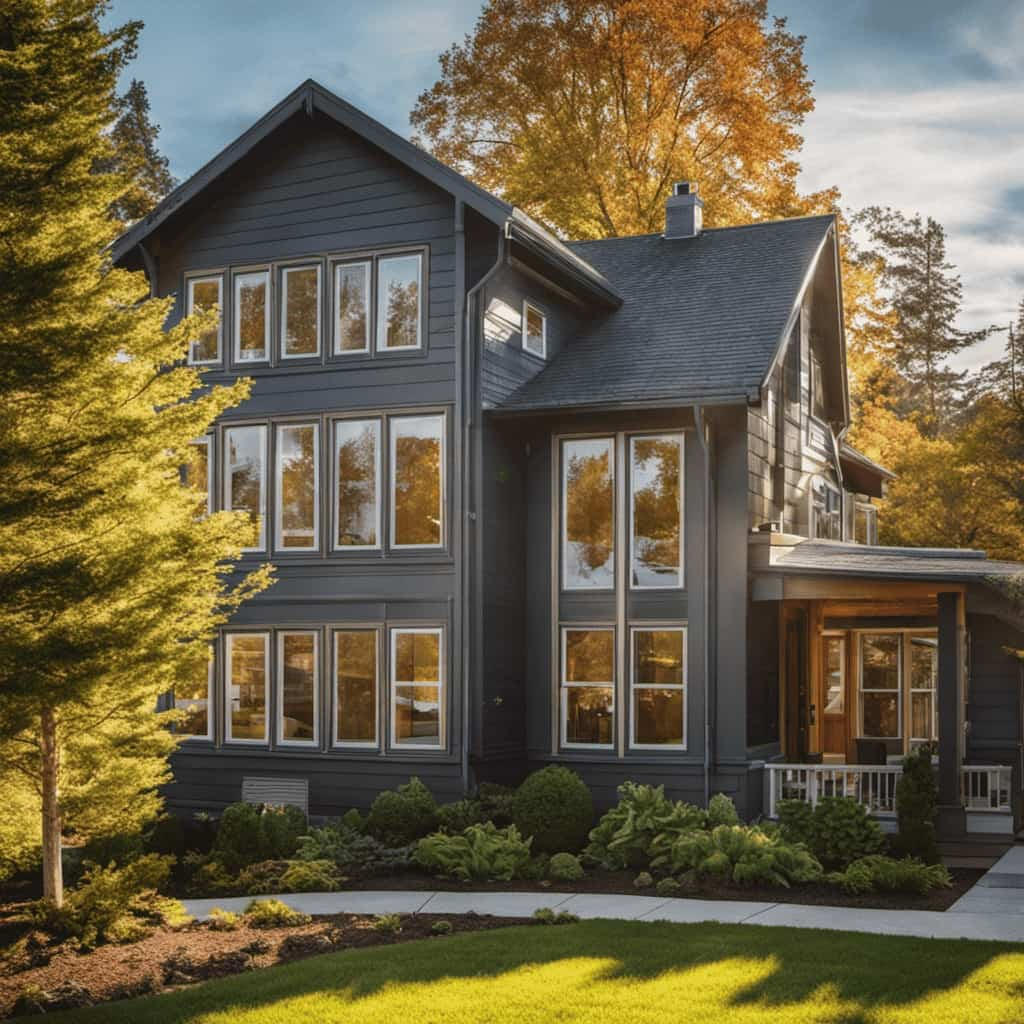
Conclusion
In conclusion, energy-efficient heat pumps are a vital component of green homes, providing sustainable heating and cooling. By understanding how they work and considering key factors when choosing a heat pump, homeowners can maximize energy savings.
Regular maintenance is also essential to ensure optimal performance and longevity. Just imagine a green home with a heat pump silently working, seamlessly providing comfort while minimizing environmental impact.
It’s a vision of a sustainable future that we can all strive for.
Air Conditioning
Heat Pumps Outperform Traditional Heating in Energy Use
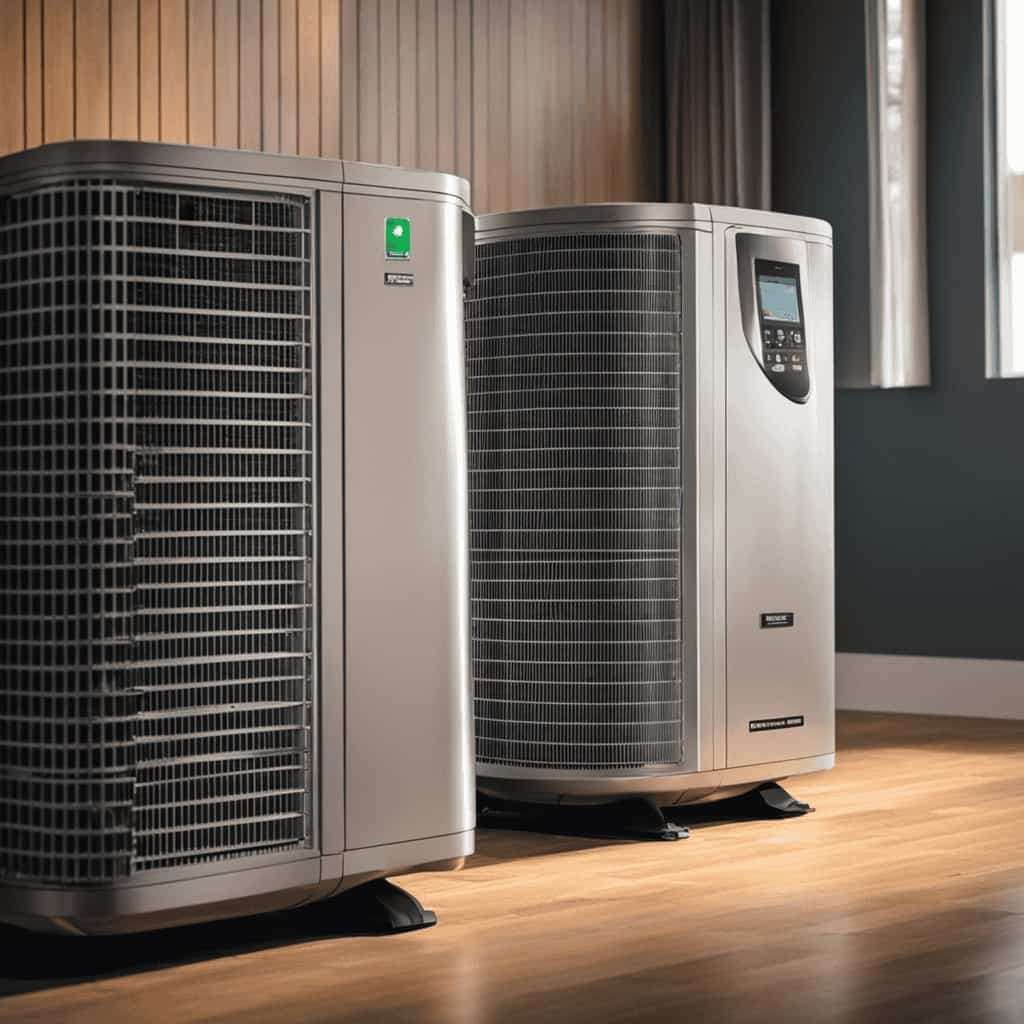
We have some thrilling news for you: heat pumps are surpassing traditional heating systems in terms of energy efficiency! Recent studies have demonstrated that heat pumps can greatly decrease electricity usage in comparison to traditional methods.
Not only that, but they also offer cost savings and have a lower environmental impact. So if you’re looking for long-term benefits and want to save money on your energy bills, heat pumps are the way to go.
Key Takeaways
- Heat pumps are more energy efficient compared to traditional heating systems.
- Heat pumps require less energy to heat a space compared to traditional heating systems, resulting in cost savings for the user.
- Heat pumps have a lower carbon footprint compared to traditional heating systems.
- Government incentives and rebates are available for installing energy-efficient heat pumps, further reducing the overall cost.
Energy Efficiency of Heat Pumps Vs. Traditional Heating Systems
We find that heat pumps are more energy efficient compared to traditional heating systems. Heat pumps use electricity to transfer heat from the outside air or ground into the building, making them highly efficient in terms of energy consumption. This means that they require less energy to heat a space compared to traditional heating systems, resulting in cost savings for the user.
Additionally, heat pumps have a lower carbon footprint compared to traditional heating systems. They don’t burn fossil fuels directly, reducing greenhouse gas emissions and contributing to a cleaner environment. This makes heat pumps a more environmentally friendly option for heating, aligning with the values of individuals seeking freedom to live in a sustainable and eco-conscious manner.

Electricity Consumption Comparison: Heat Pumps Vs. Traditional Heating
The electricity consumption of heat pumps is compared to that of traditional heating systems. To provide a clear analysis of electricity consumption, let’s compare the energy savings of heat pumps and traditional heating systems in a 3×3 table:
| System | Electricity Consumption | Energy Savings |
|---|---|---|
| Heat Pumps | Lower | Significant |
| Traditional Heating | Higher | Less significant |
As shown in the table, heat pumps have lower electricity consumption compared to traditional heating systems. This translates into significant energy savings for users. Heat pumps are designed to efficiently extract heat from the surrounding environment, making them more energy-efficient than traditional heating methods. By utilizing renewable energy sources, such as air, water, or the ground, heat pumps reduce reliance on fossil fuels and contribute to a greener and more sustainable future. With their superior energy efficiency, heat pumps are an excellent choice for those looking to minimize electricity consumption while maximizing energy savings.
Cost Savings With Heat Pumps: a Comparative Analysis
Comparing the cost savings of heat pumps to traditional heating systems provides valuable insights into the potential financial benefits of using heat pumps. When it comes to cost savings, heat pumps have a clear advantage over traditional heating systems. Here are some key points to consider:
-
Energy savings: Heat pumps are highly efficient and can save homeowners a significant amount of money on their energy bills. They can extract heat from the air or ground, making them much more energy-efficient than traditional heating systems.

-
Return on investment: While heat pumps may have a higher upfront cost, their long-term savings can make up for it. The energy savings over time can result in a positive return on investment for homeowners.
-
Lower operating costs: Heat pumps require less energy to operate compared to traditional heating systems, resulting in lower monthly utility bills.
-
Reduced maintenance costs: Heat pumps are generally low-maintenance, which means homeowners can save on costly repairs and maintenance fees.
-
Potential incentives: In many areas, there are government incentives and rebates available for installing energy-efficient heat pumps, further reducing the overall cost.
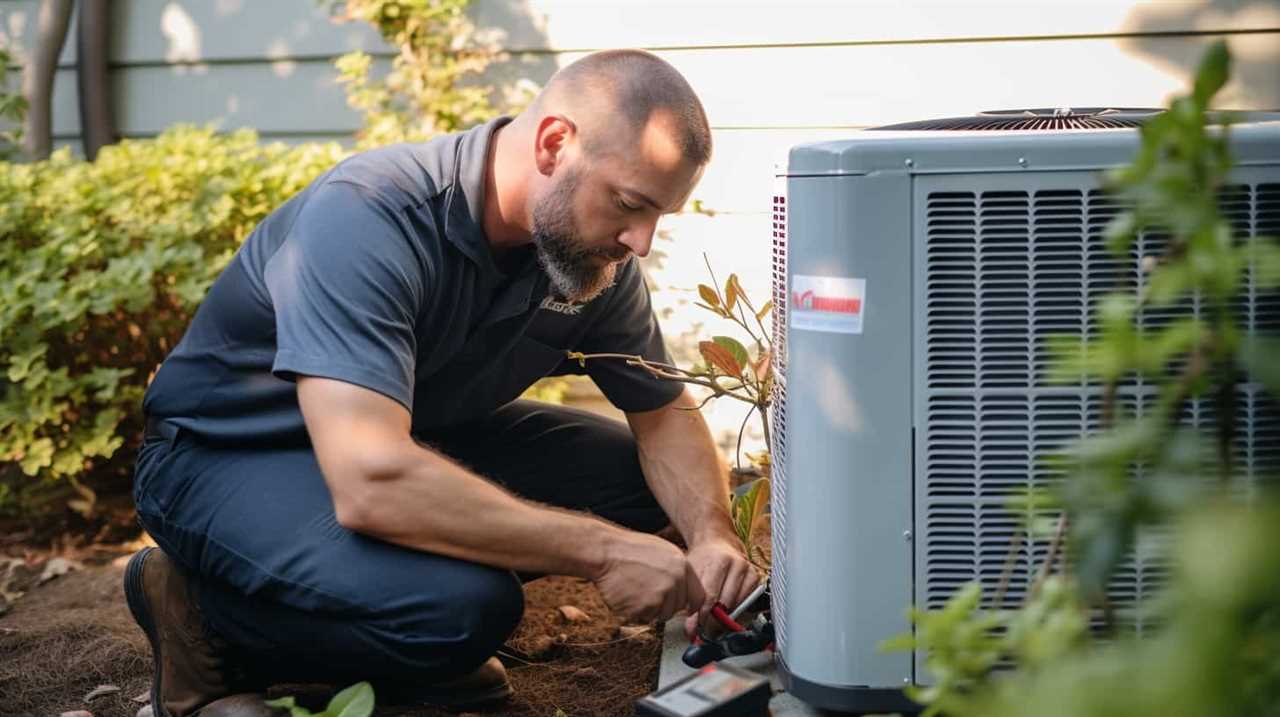
Environmental Impact: Heat Pumps Vs. Traditional Heating Methods
While traditional heating methods contribute to environmental degradation, heat pumps offer a more sustainable alternative. Heat pumps utilize renewable energy sources, such as the air or ground, to provide heating and cooling for homes and buildings. This means they produce fewer carbon emissions compared to traditional heating methods that rely on fossil fuels. By reducing carbon emissions, heat pumps play a crucial role in mitigating climate change and promoting a cleaner environment.
Additionally, heat pumps can be integrated with renewable energy systems, such as solar panels, further reducing reliance on non-renewable energy sources. This integration allows for a more efficient and environmentally-friendly heating solution.
Long-Term Benefits of Heat Pumps in Electricity Usage
As we consider the long-term benefits of heat pumps in electricity usage, it’s important to recognize that they significantly reduce energy consumption compared to traditional heating methods. This not only leads to cost savings in the long run but also contributes to energy conservation efforts.
Here are some key points to highlight:
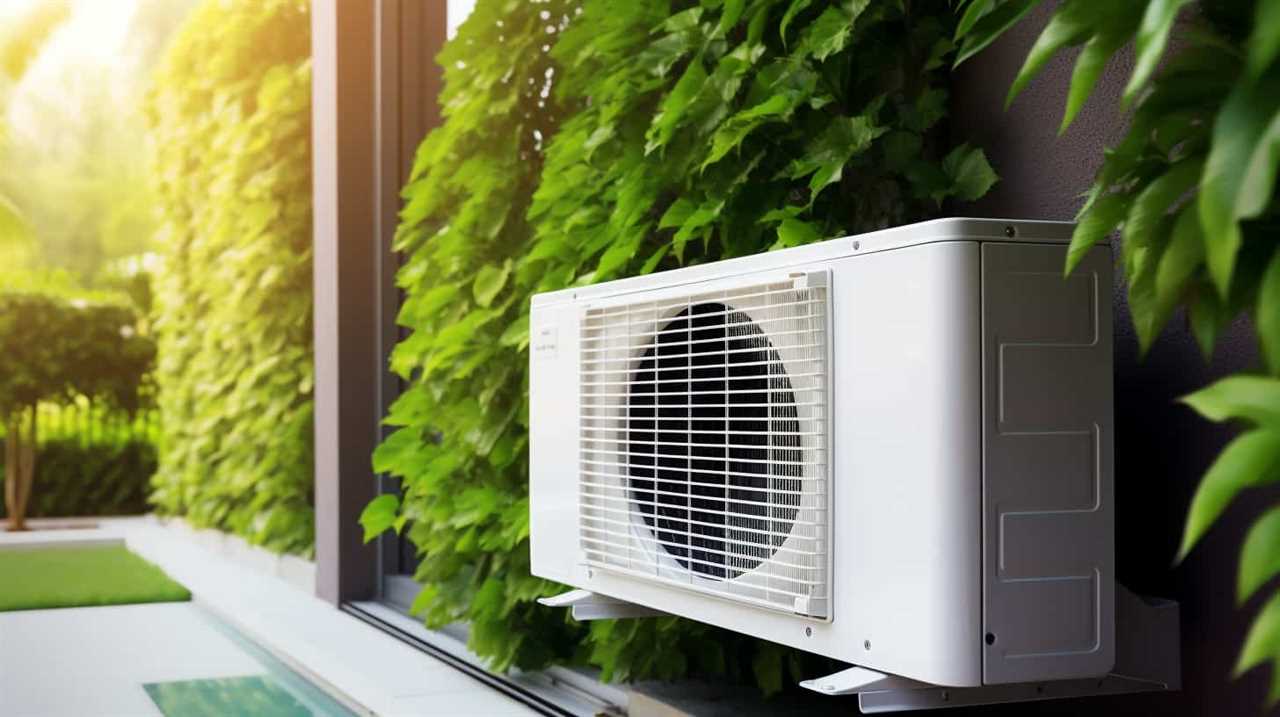
- Heat pumps are highly efficient in converting electricity into heat, resulting in lower energy consumption.
- By reducing energy usage, heat pumps help to lower electricity bills and provide long-term savings.
- Heat pumps have a longer lifespan compared to traditional heating systems, reducing the need for frequent replacements.
- The use of heat pumps can reduce greenhouse gas emissions, contributing to a cleaner environment.
- Heat pumps can be integrated with renewable energy sources, further reducing reliance on fossil fuels.
Frequently Asked Questions
What Are the Different Types of Heat Pumps Available in the Market?
There are several types of heat pumps available in the market. They include air source heat pumps, geothermal heat pumps, and hybrid heat pumps. Each type has its own advantages in terms of heat pump efficiency and benefits of heat pump technology.
How Do Heat Pumps Work in Cold Climates?
In cold climates, heat pumps work efficiently by extracting heat from the outside air or ground and transferring it indoors. This provides an energy-efficient heating solution, making heat pumps advantageous in cold weather.
Are Heat Pumps Suitable for Both Residential and Commercial Buildings?
Heat pumps are a cost-effective solution for both residential and commercial buildings. They not only provide efficient heating and cooling, but also offer environmental benefits by significantly reducing carbon emissions compared to traditional heating methods.
Can Heat Pumps Be Used for Both Heating and Cooling Purposes?
Heat pumps are a versatile solution for both heating and cooling. They offer several advantages for cooling, such as energy efficiency and lower operating costs compared to traditional cooling systems.
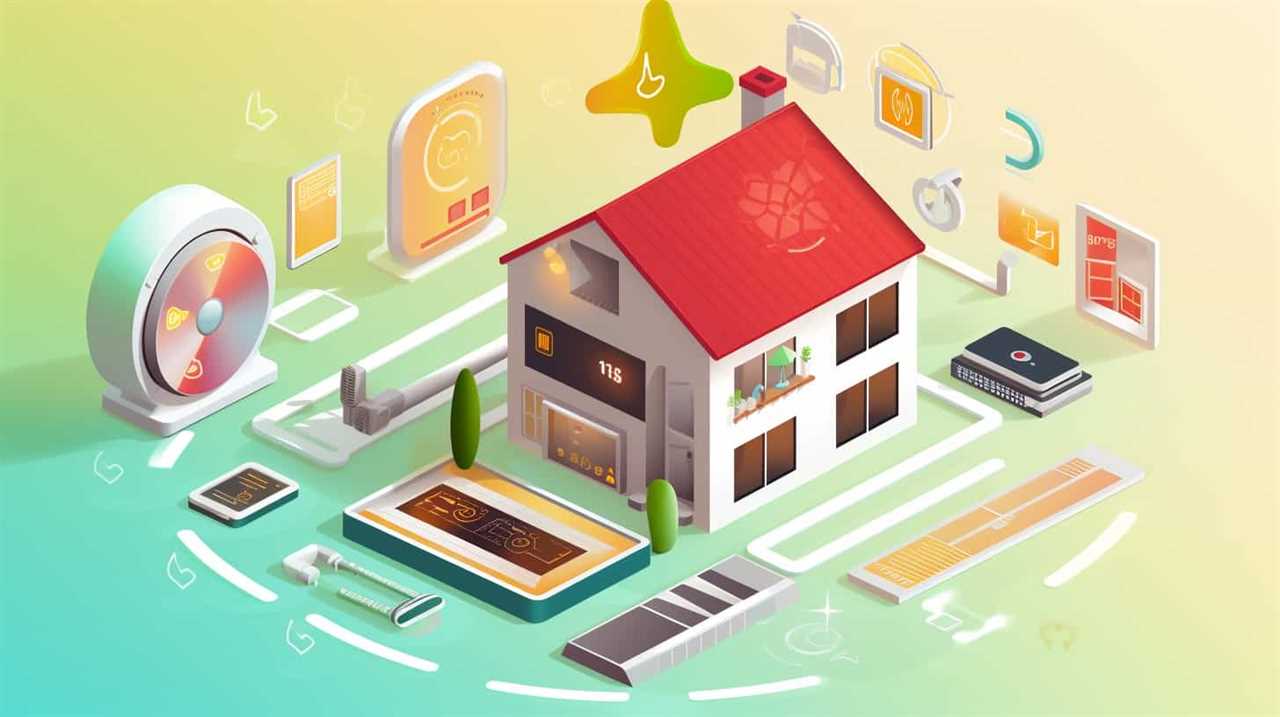
Are There Any Government Incentives or Rebates Available for Installing Heat Pumps?
There are government incentives available for installing heat pumps, which can help offset the cost. Heat pumps are known for their energy efficiency, making them an attractive option for those looking to save on heating and cooling expenses.
Conclusion
In conclusion, heat pumps have proven to be a superior option in terms of energy efficiency, electricity consumption, cost savings, and environmental impact when compared to traditional heating methods.
Their long-term benefits in electricity usage make them a smart choice for homeowners looking to reduce their energy consumption and carbon footprint.
Switching to heat pumps coincides with a greener future and a more sustainable way of heating our homes.
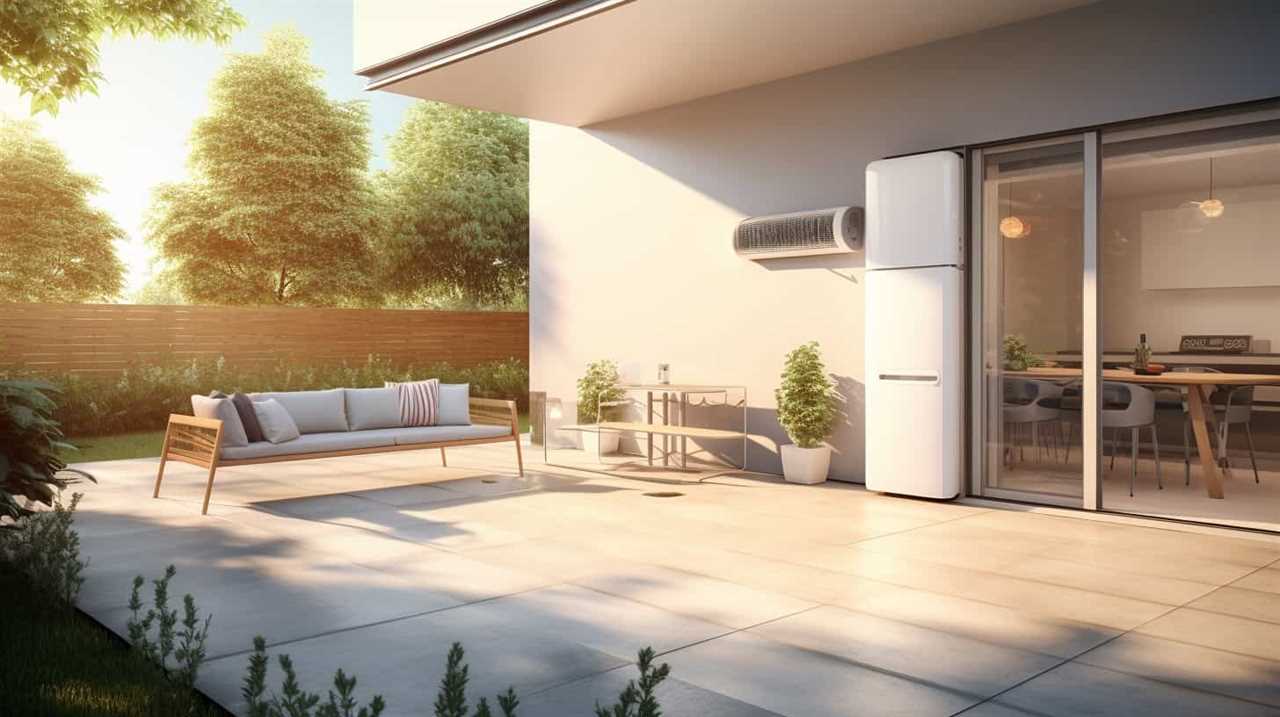
-

 Residential and Commercial Applications2 weeks ago
Residential and Commercial Applications2 weeks agoBest Amana Heat Pump Reviews
-

 Thermal Energy Transfer2 weeks ago
Thermal Energy Transfer2 weeks agoBreakthroughs in Modern Heat Pump Systems: Thermal Energy Edition
-

 Residential and Commercial Applications2 weeks ago
Residential and Commercial Applications2 weeks agoBest Heat Pump
-

 Geothermal Heat Pumps3 months ago
Geothermal Heat Pumps3 months agoUpgrade Your Comfort with Our Efficient HVAC Systems
-

 Air Conditioning3 months ago
Air Conditioning3 months agoExploring Energy-Efficient Air Conditioning Heat Pumps
-

 Geothermal Heat Pumps3 months ago
Geothermal Heat Pumps3 months agoInnovative Geothermal Heat Pump Manufacturers Revolutionize Energy Efficiency
-

 Thermal Energy Transfer1 month ago
Thermal Energy Transfer1 month agoBoost Your Heat Pump Efficiency: Interactive Guide
-

 Residential and Commercial Applications2 weeks ago
Residential and Commercial Applications2 weeks agoBest Portable Heat Pump Heat & AC










